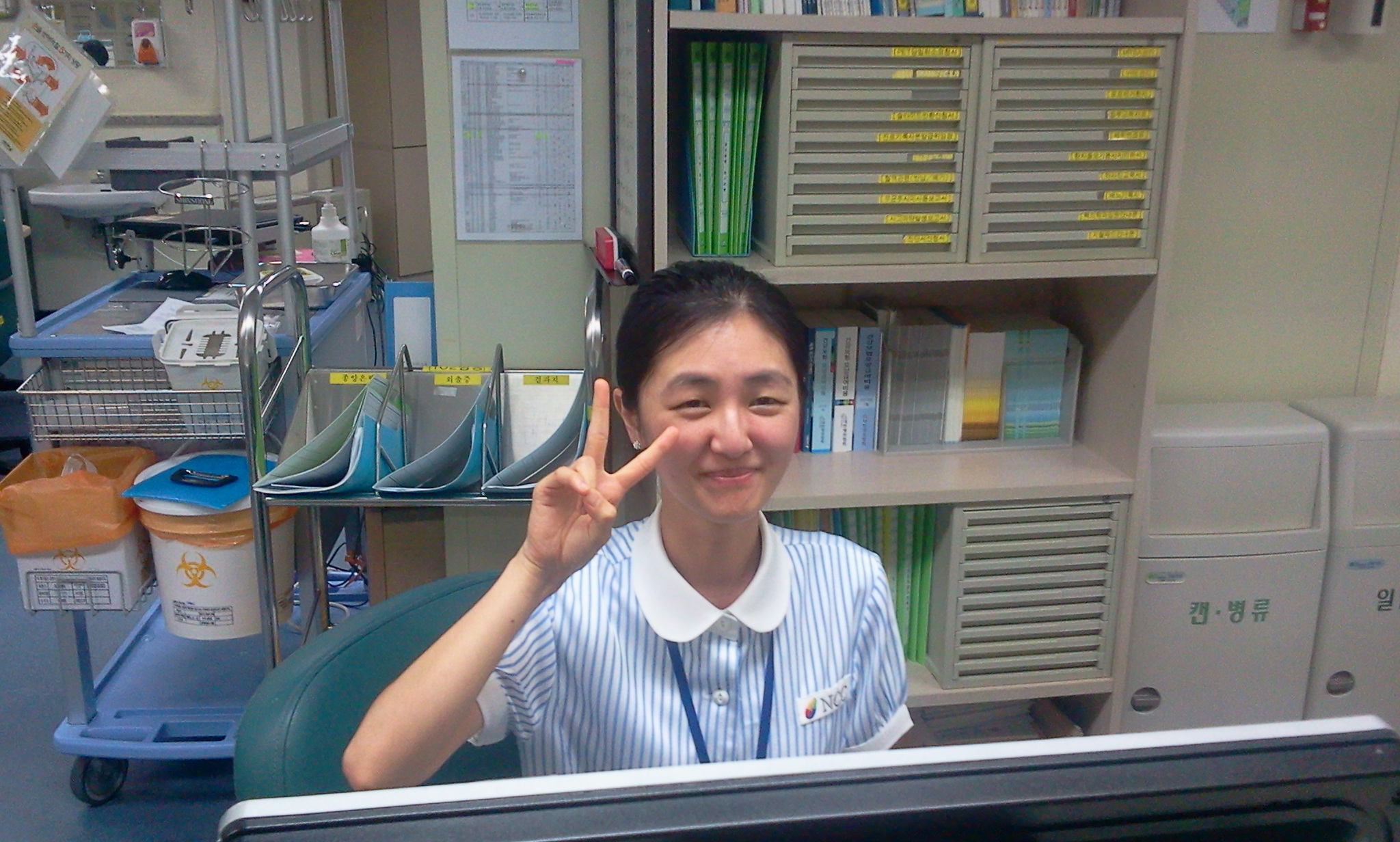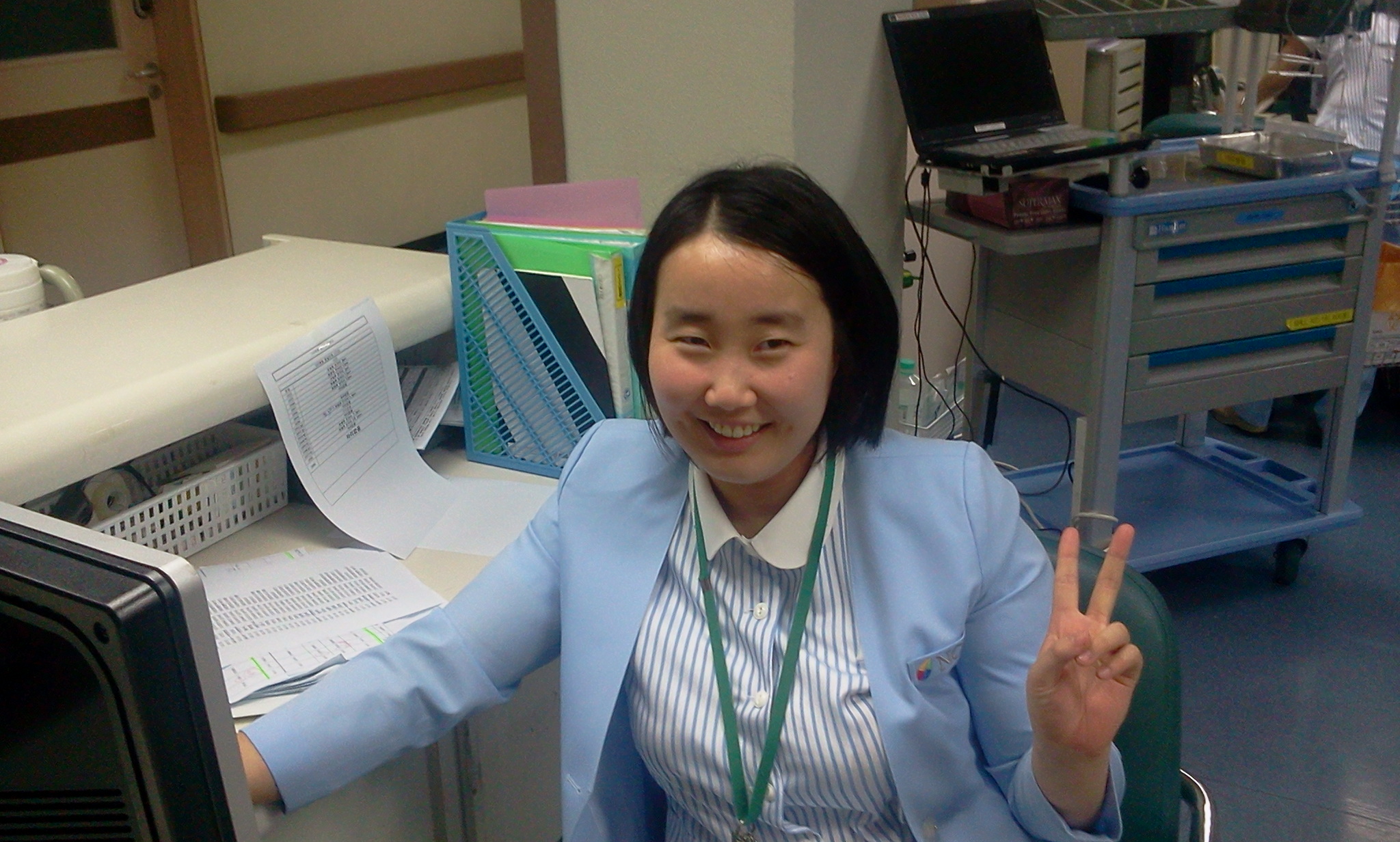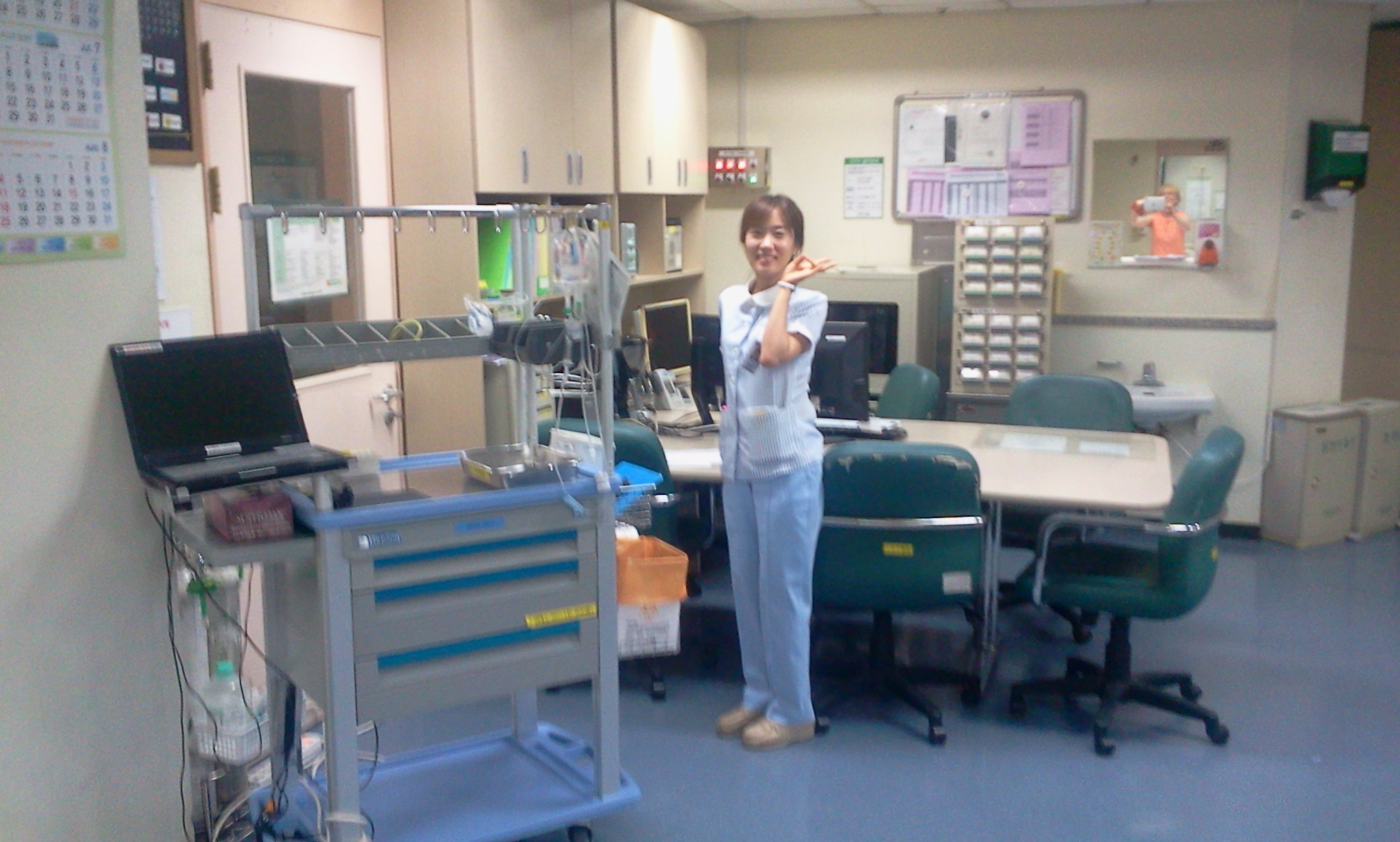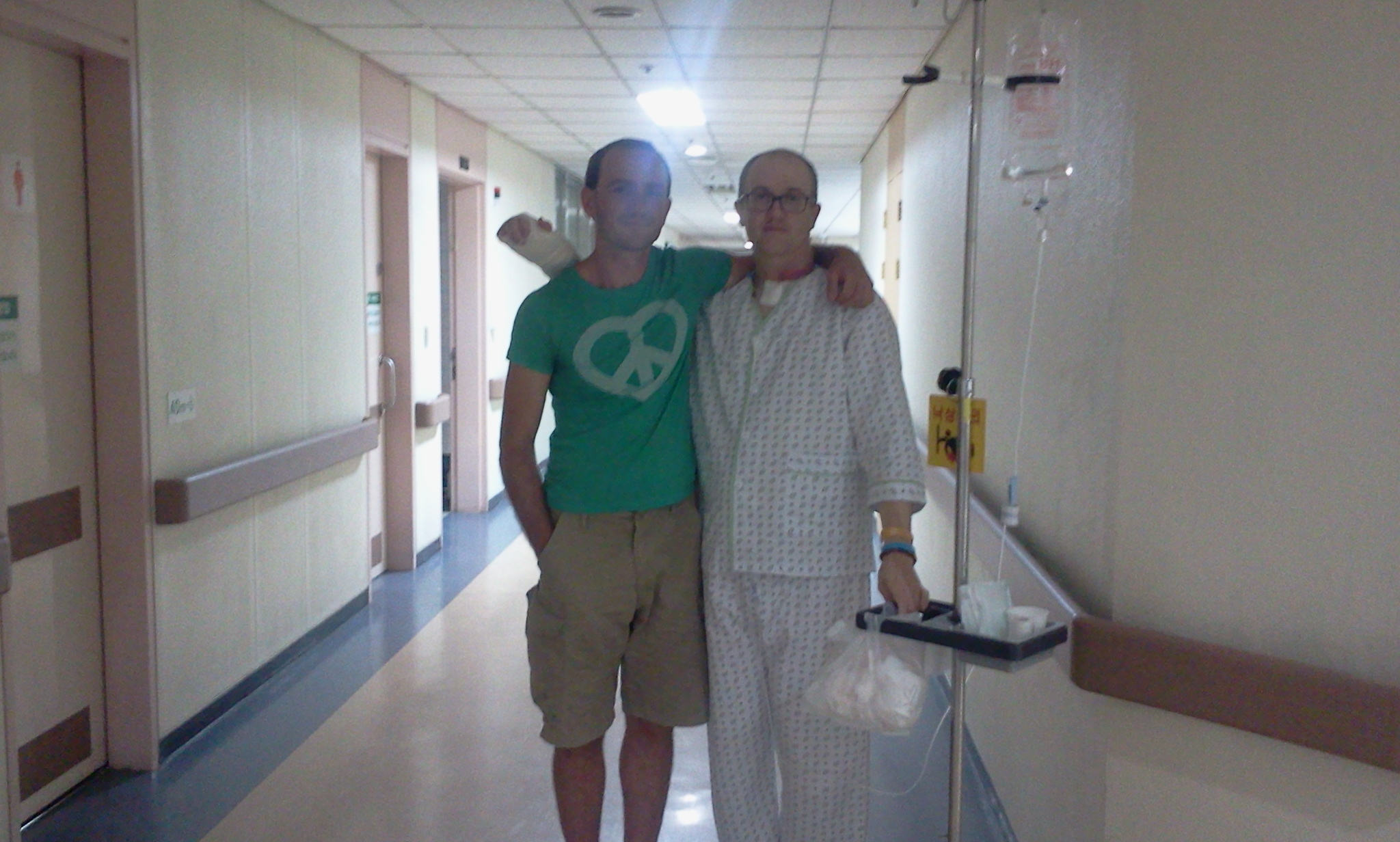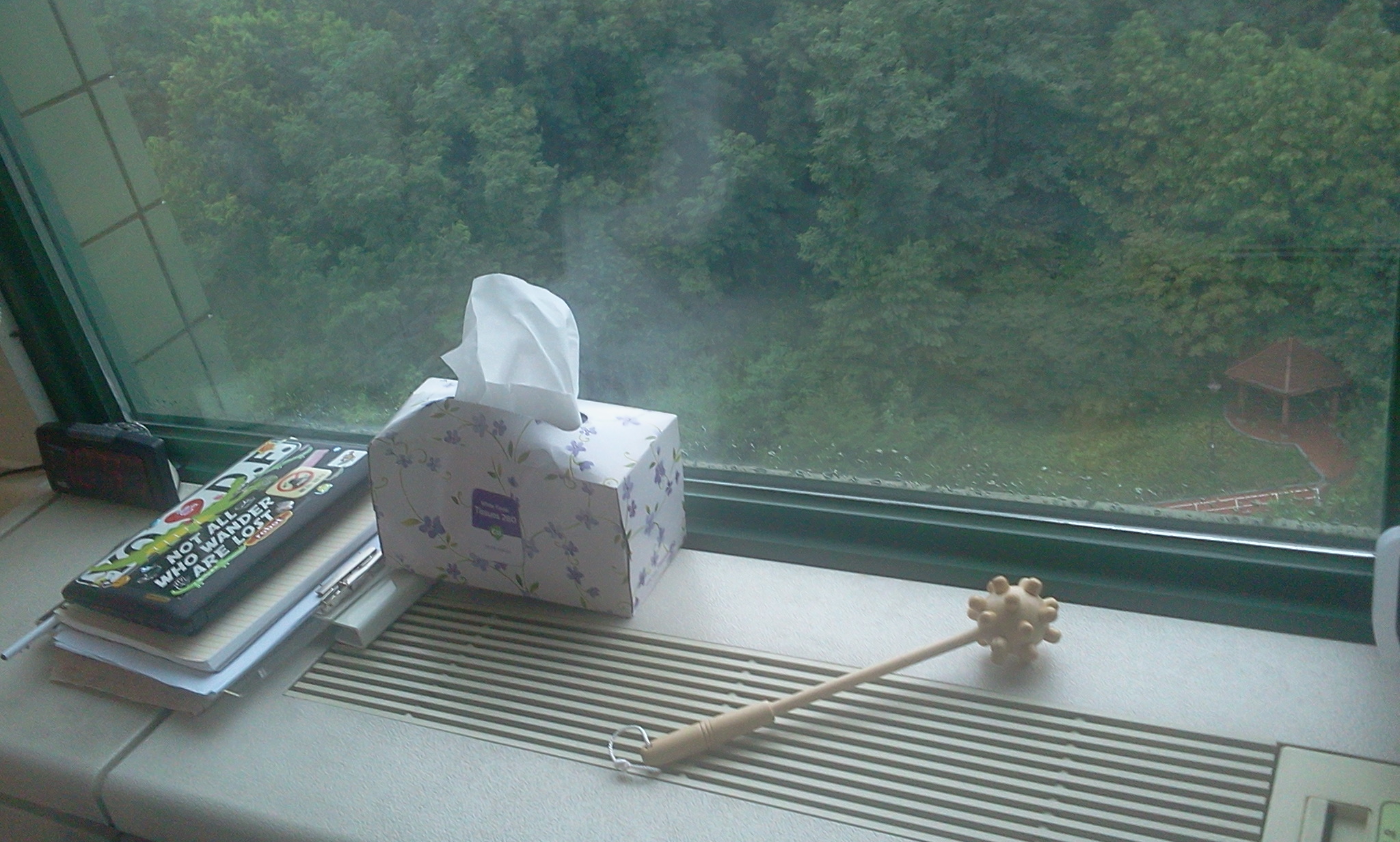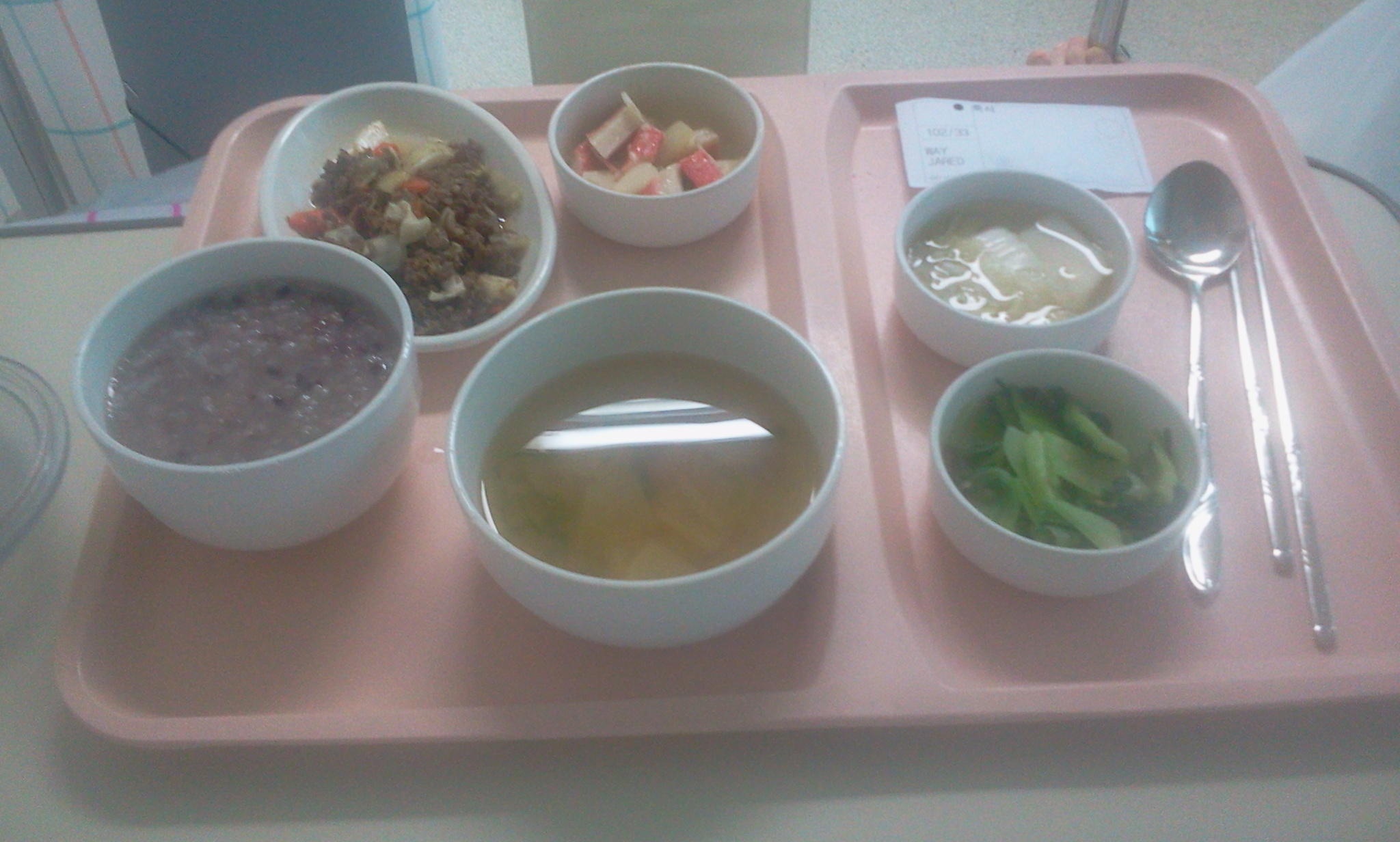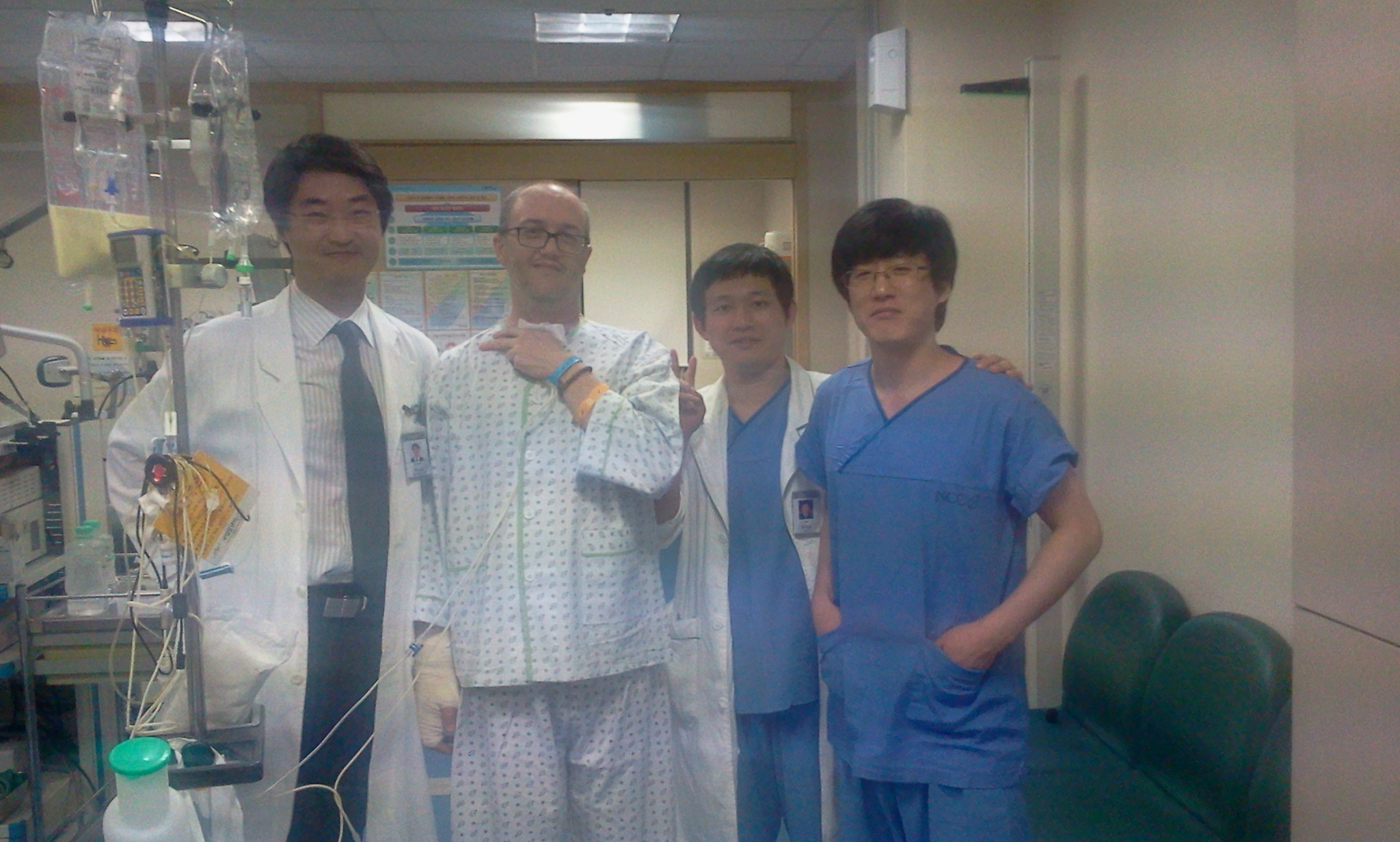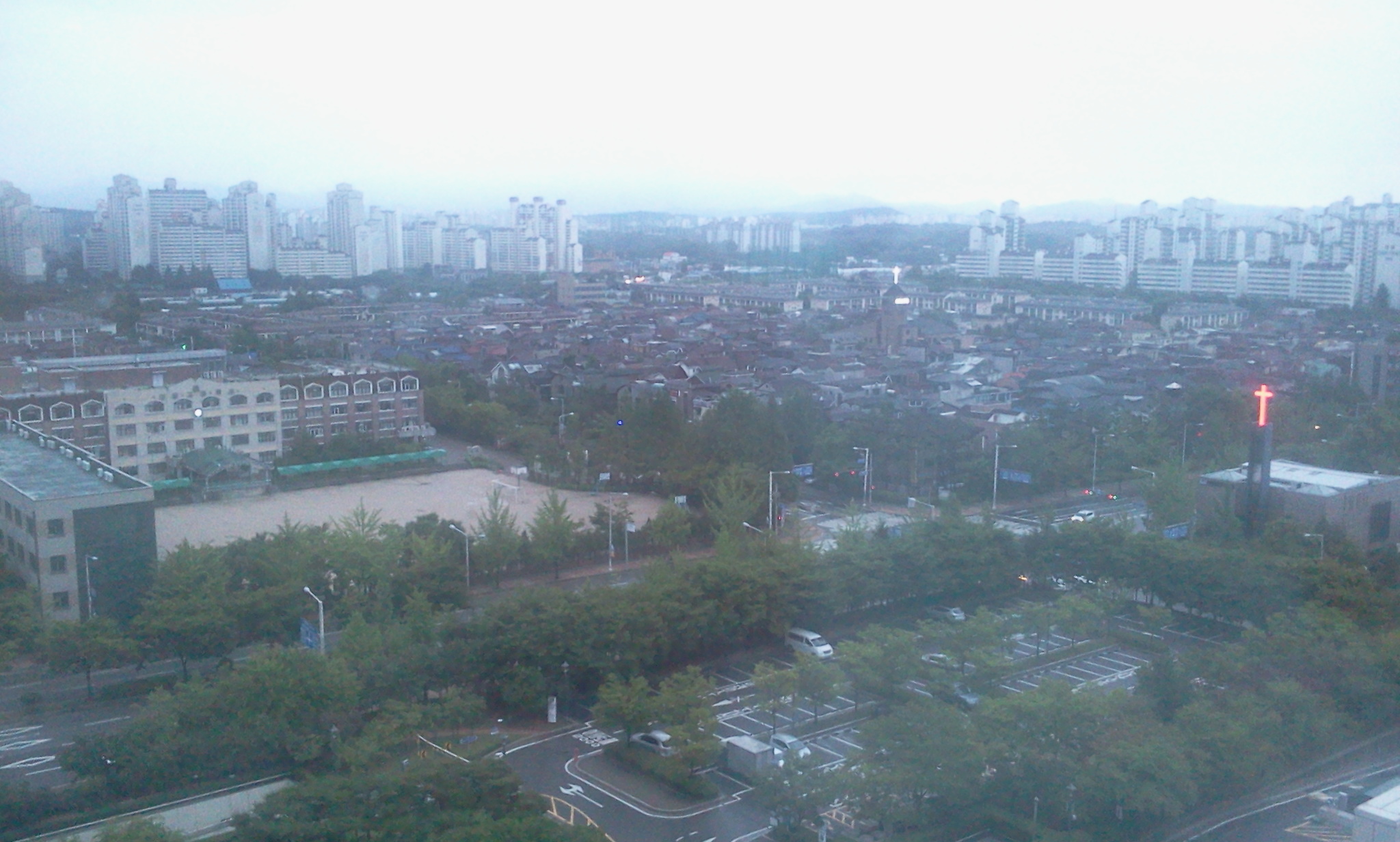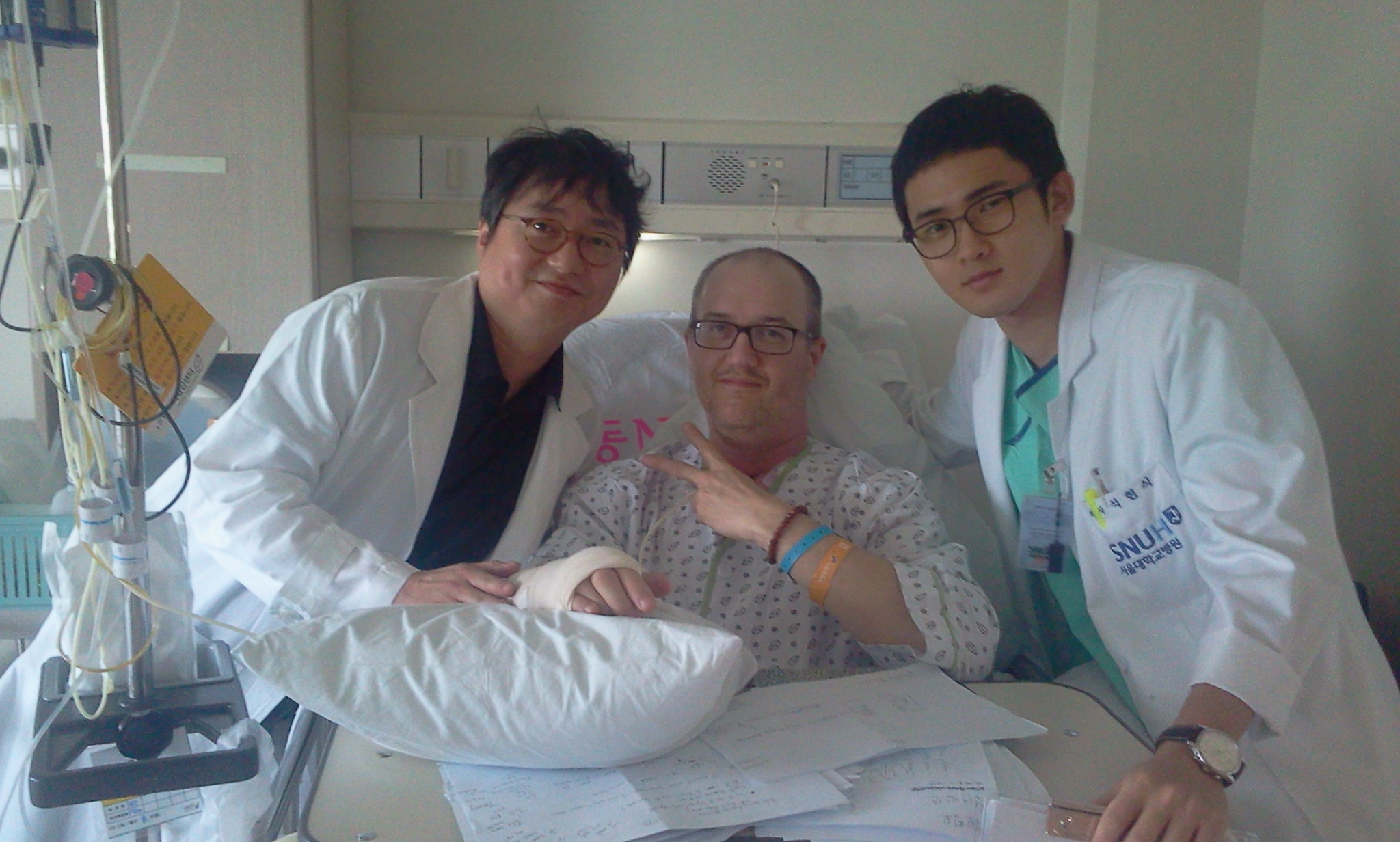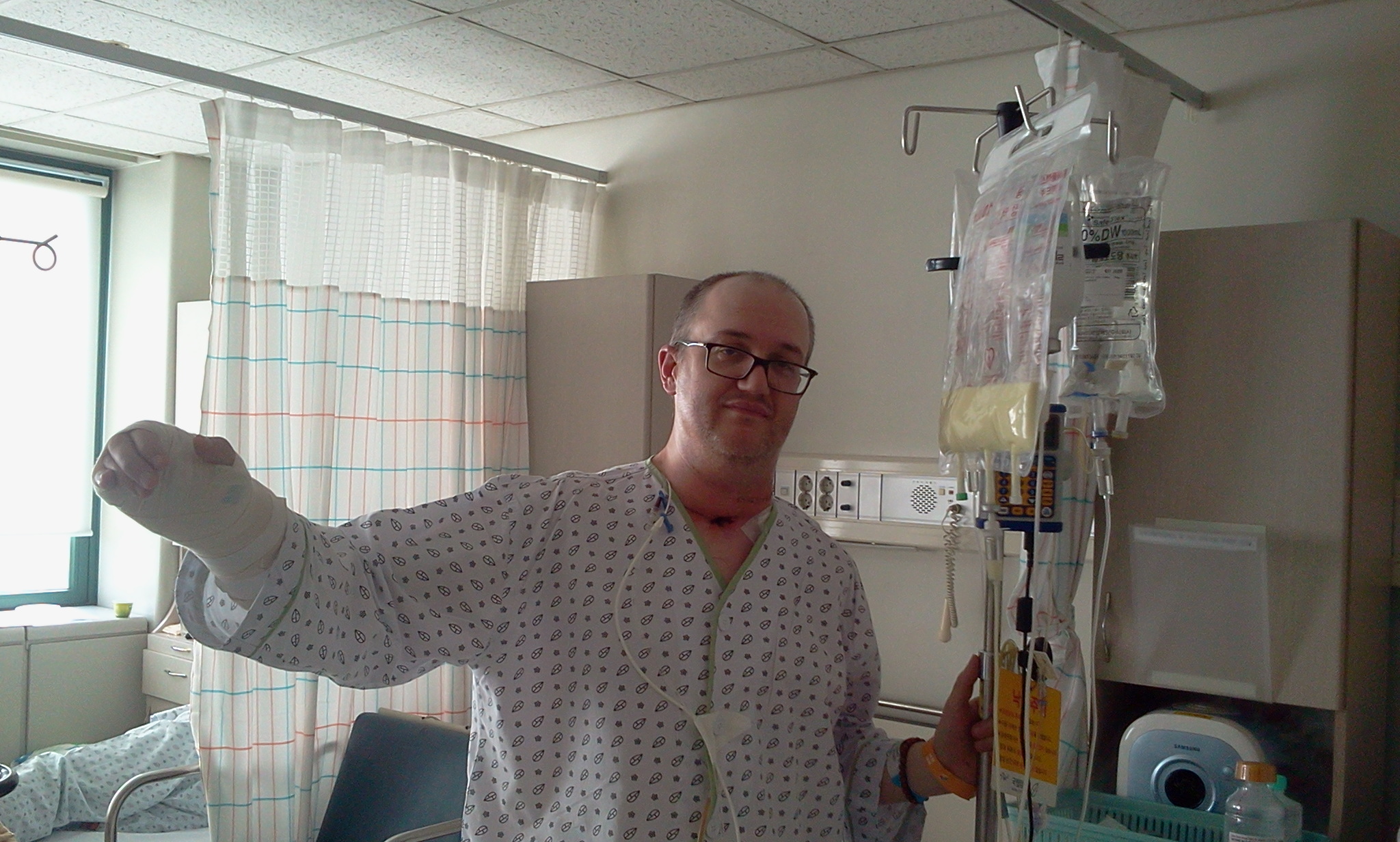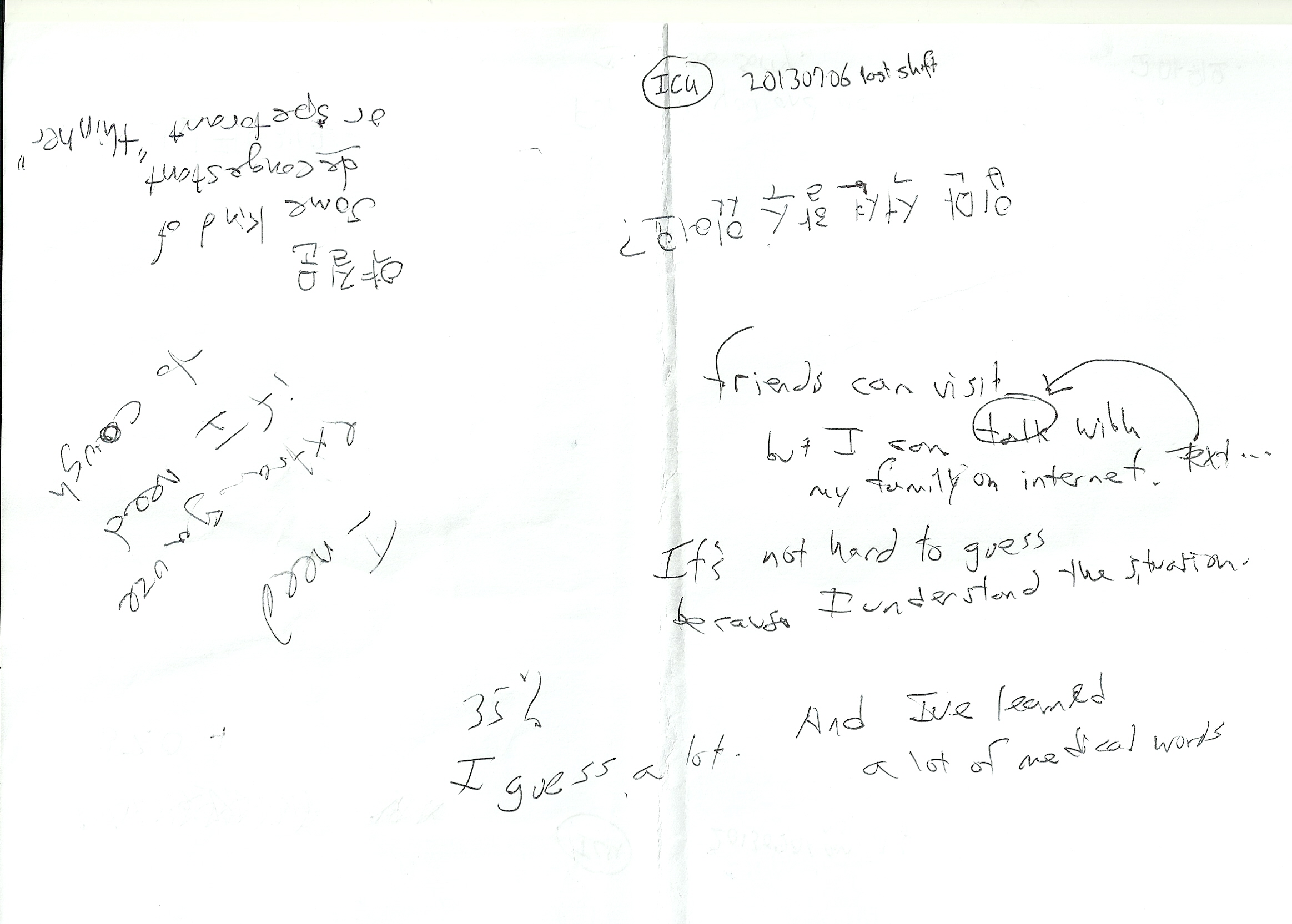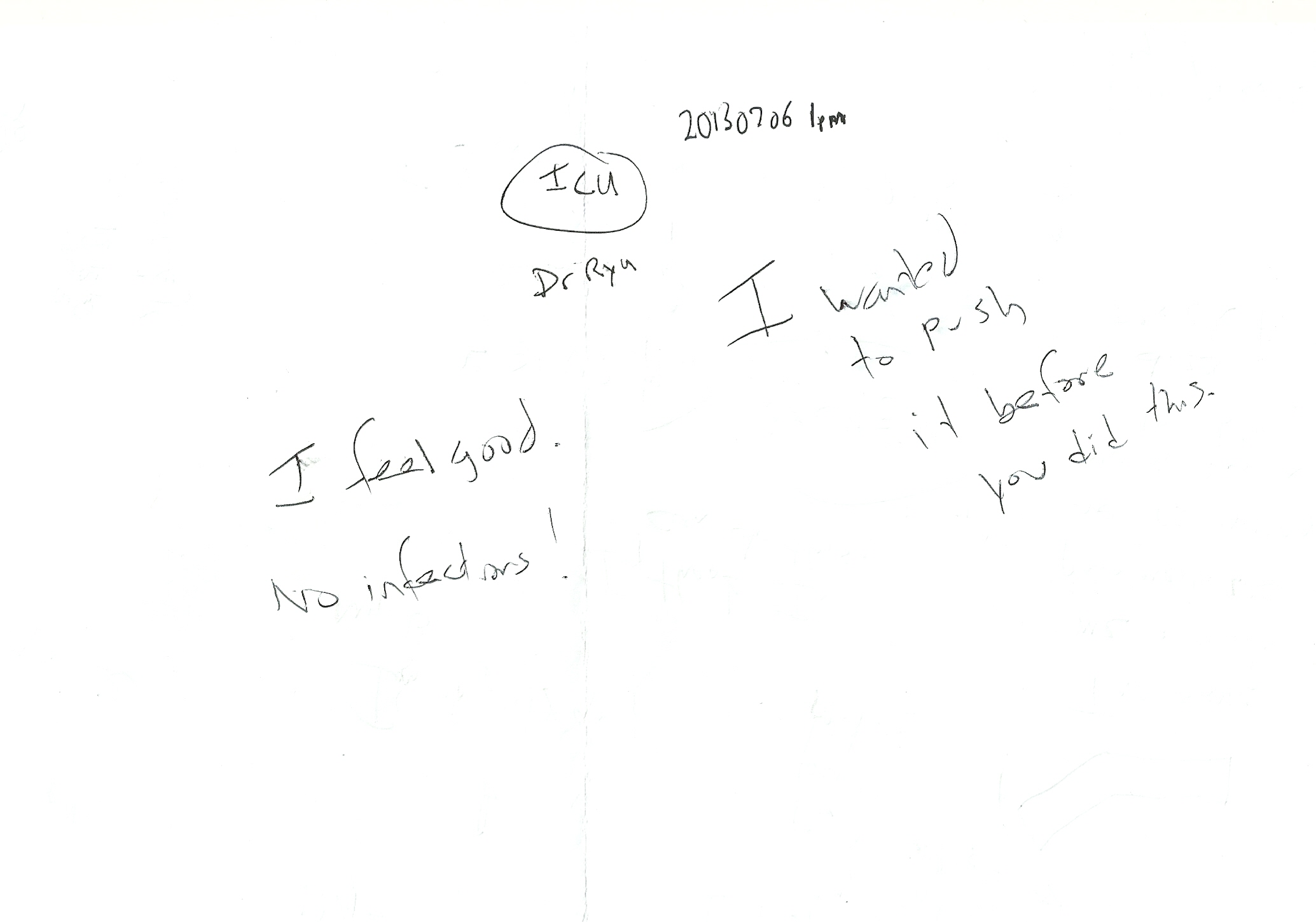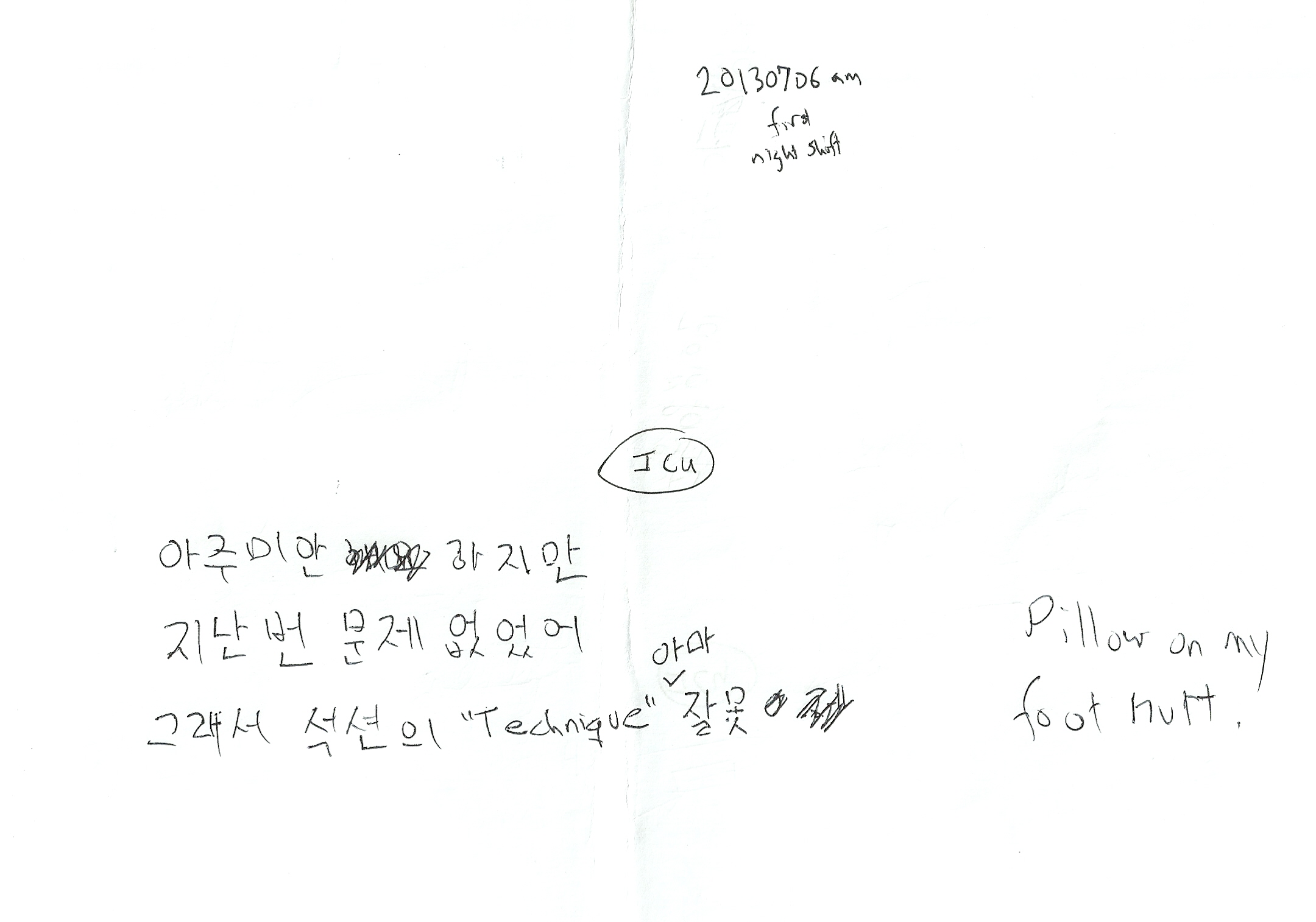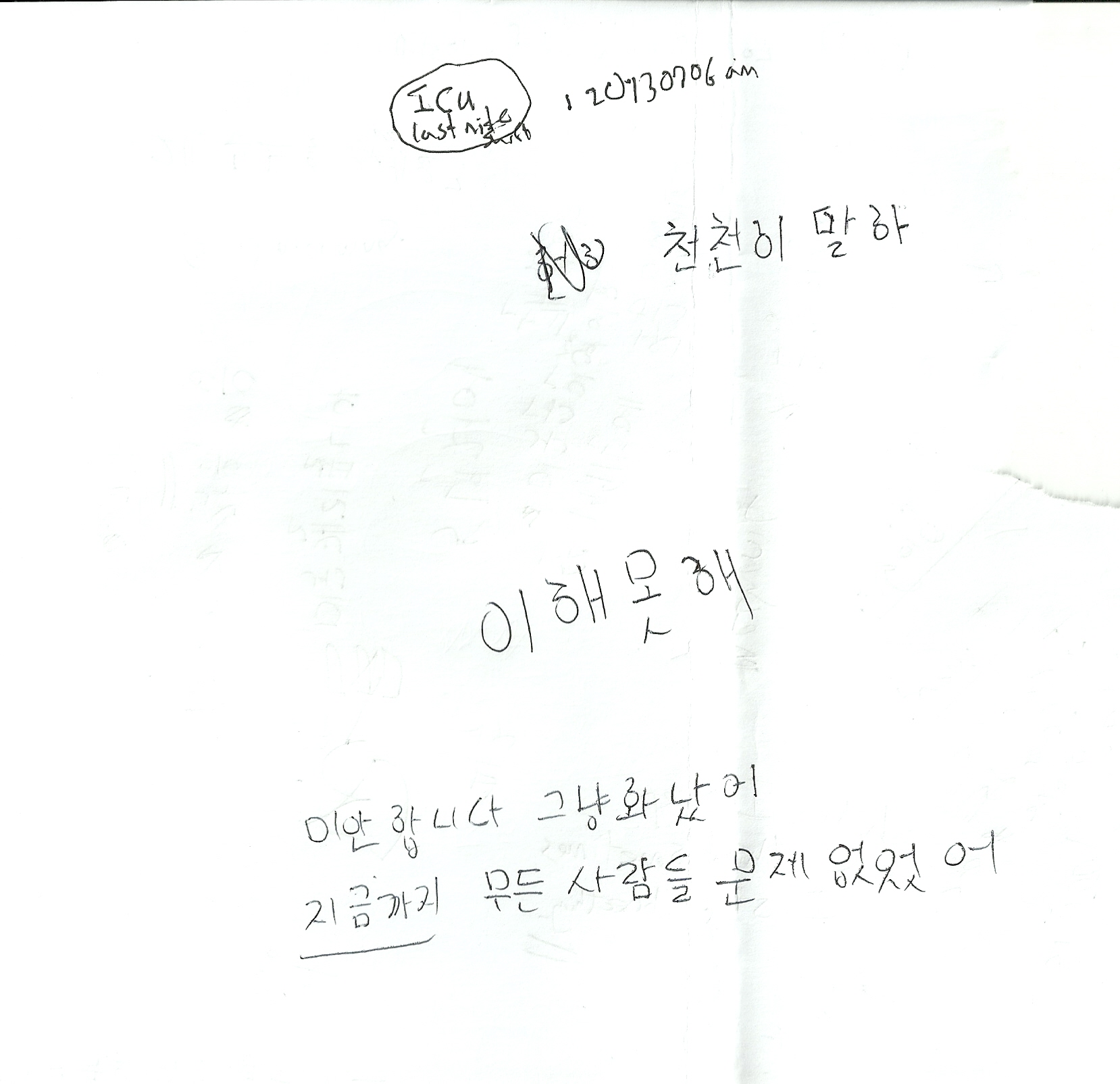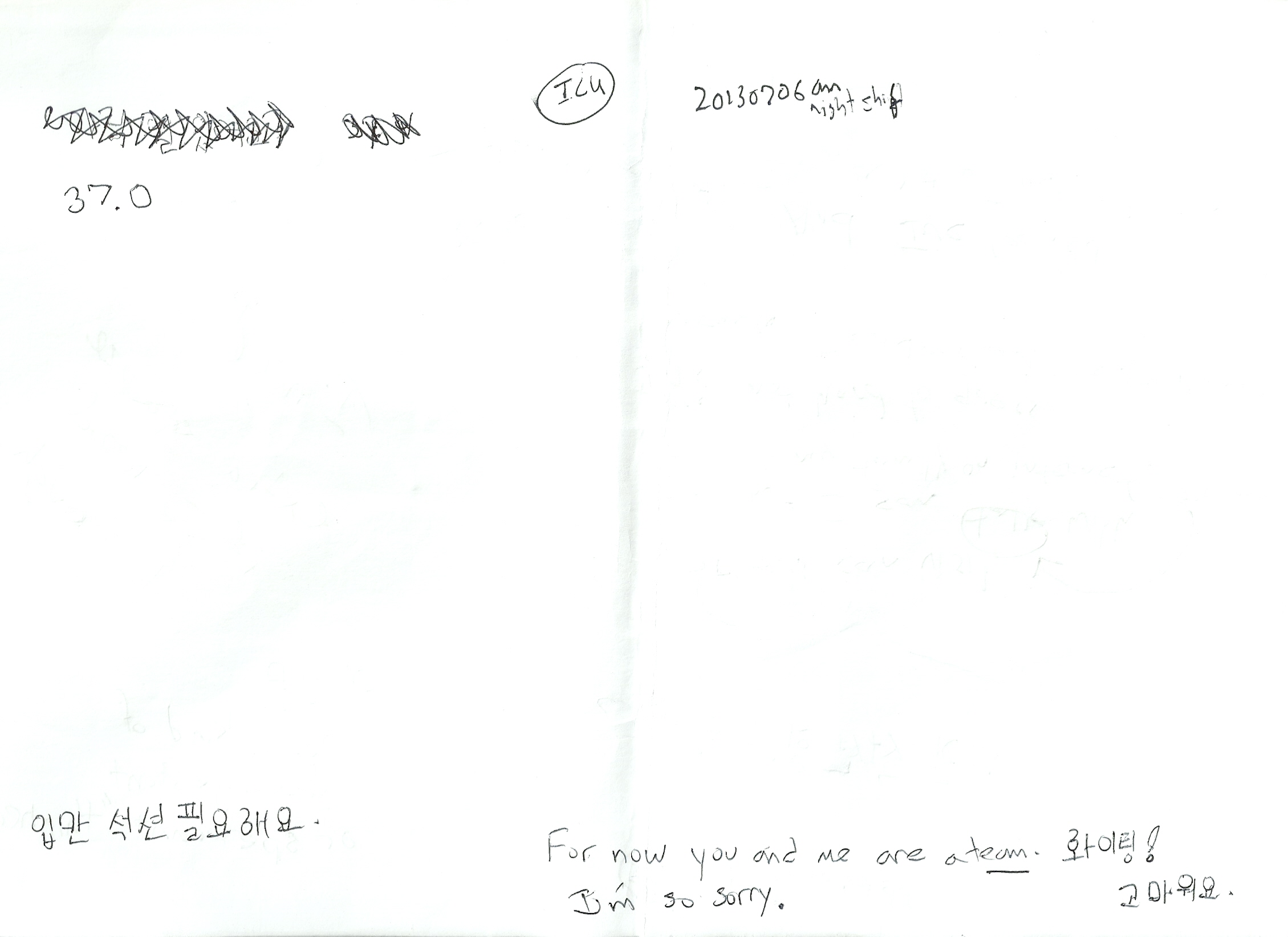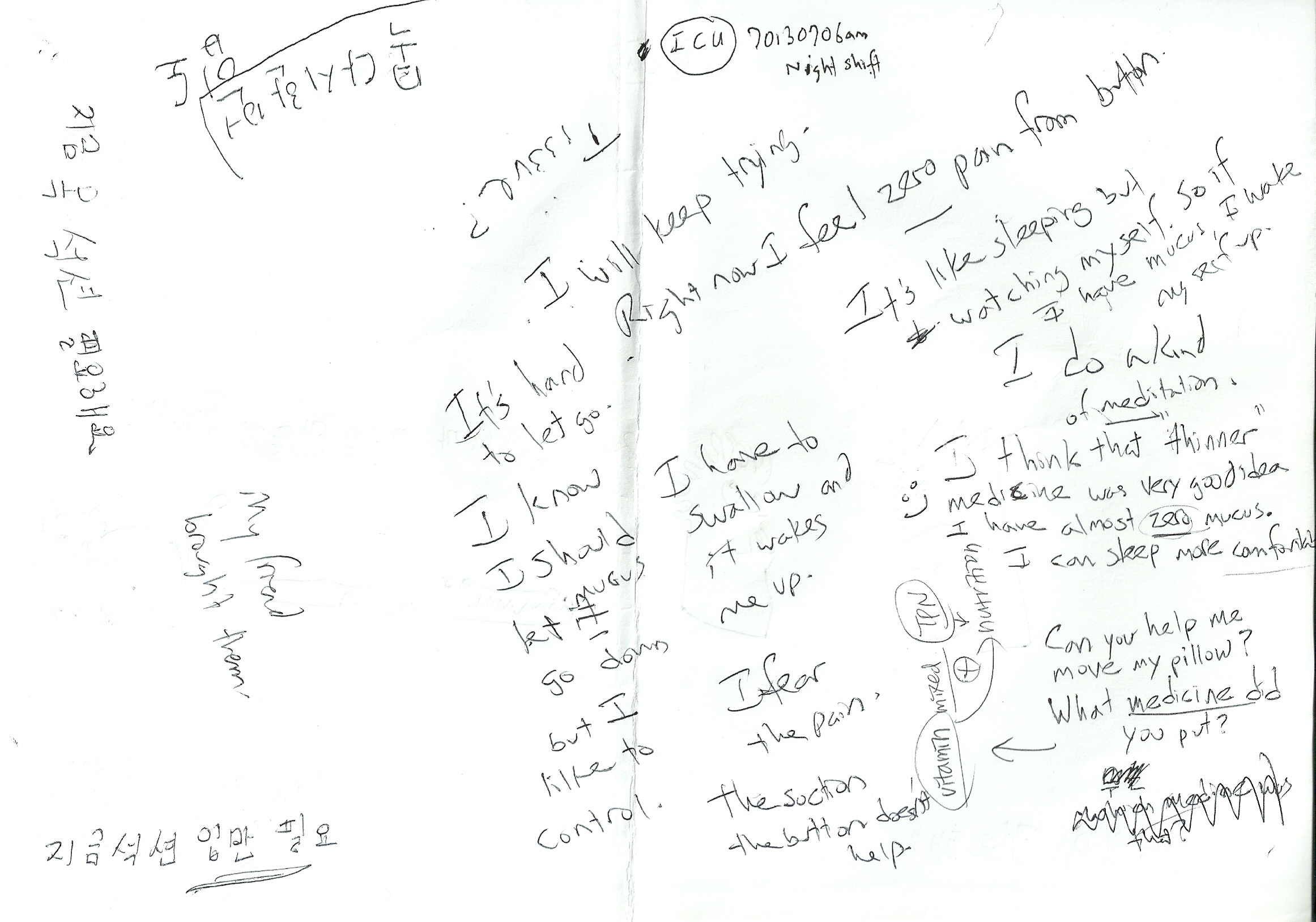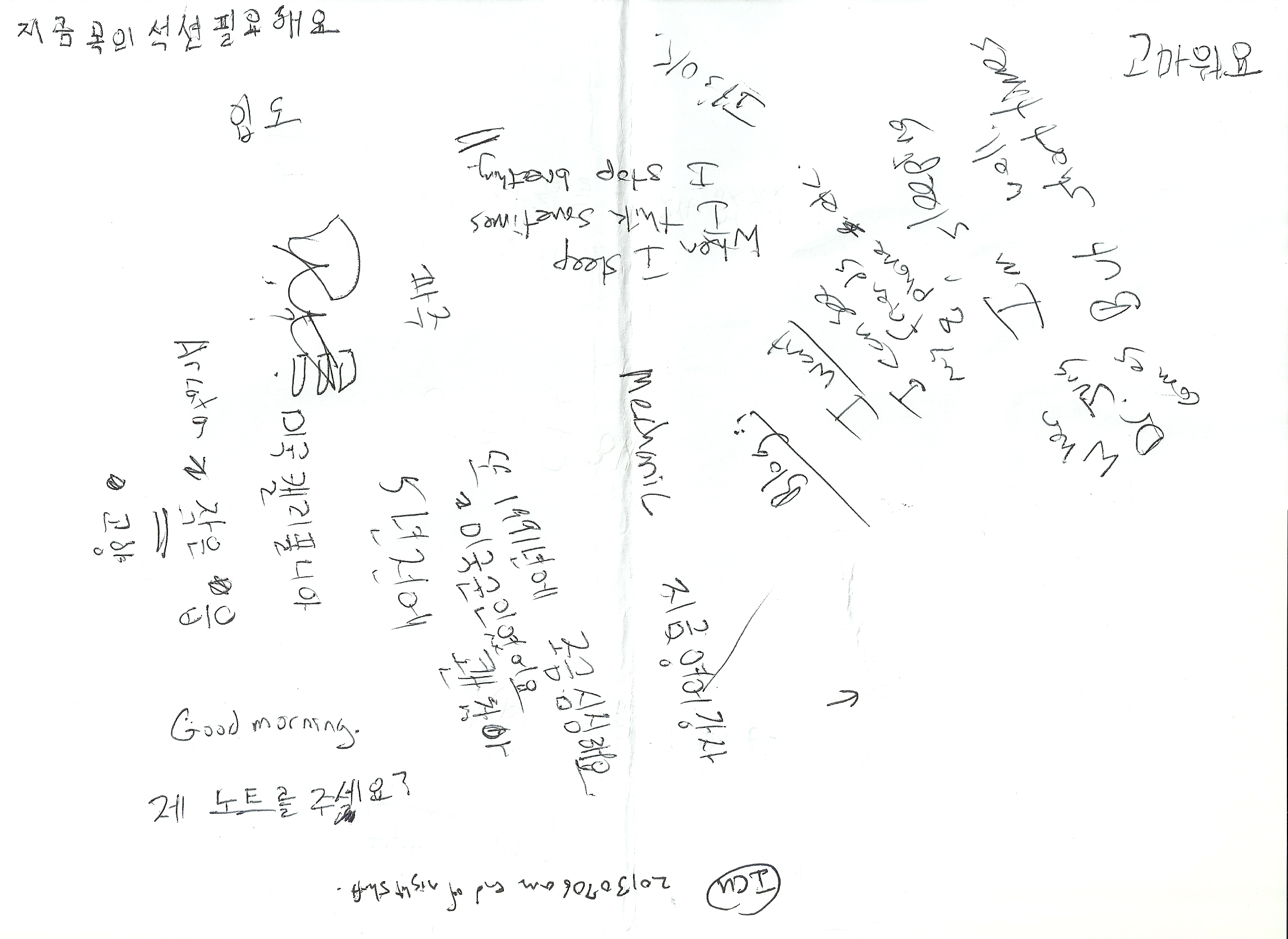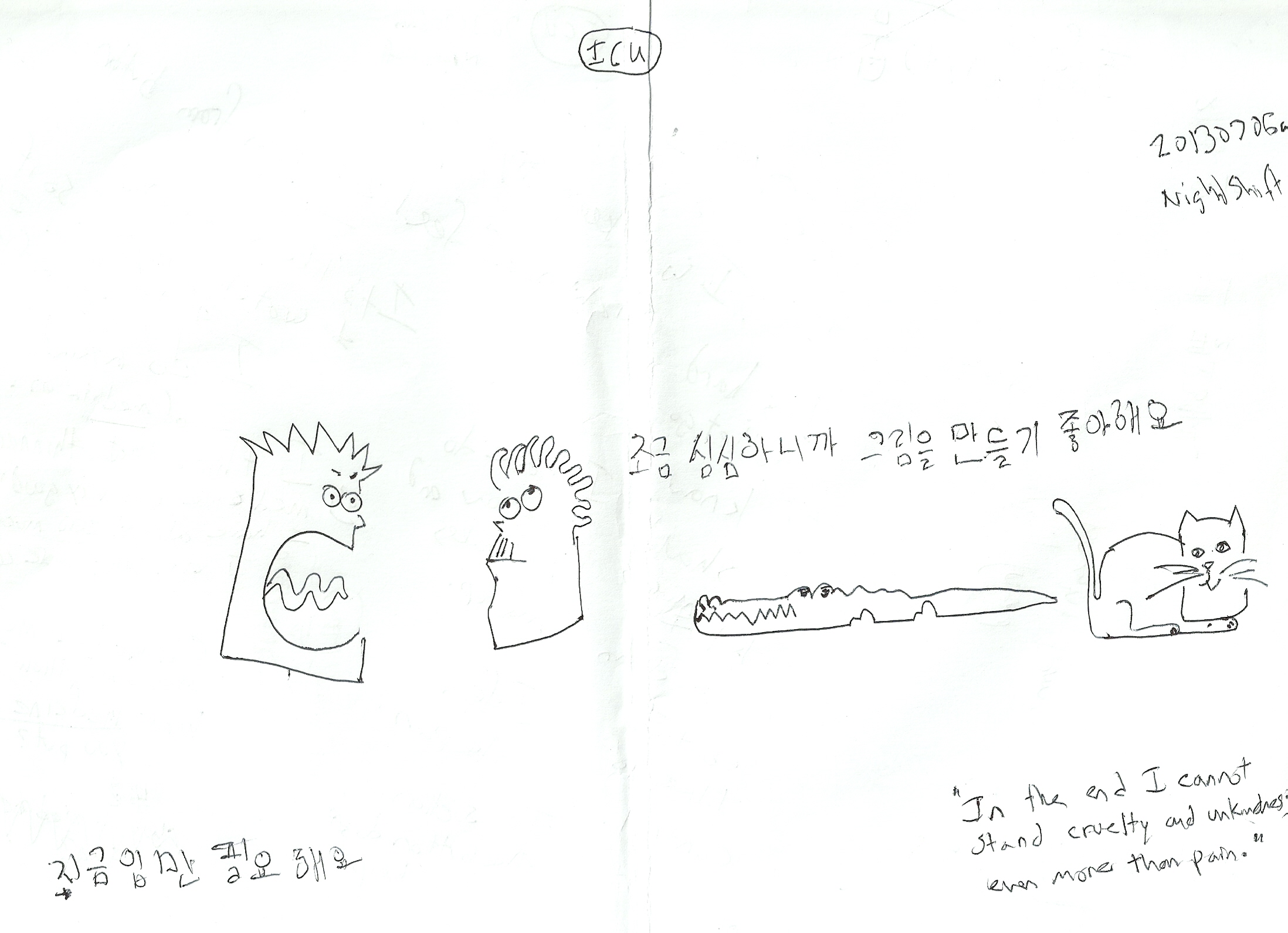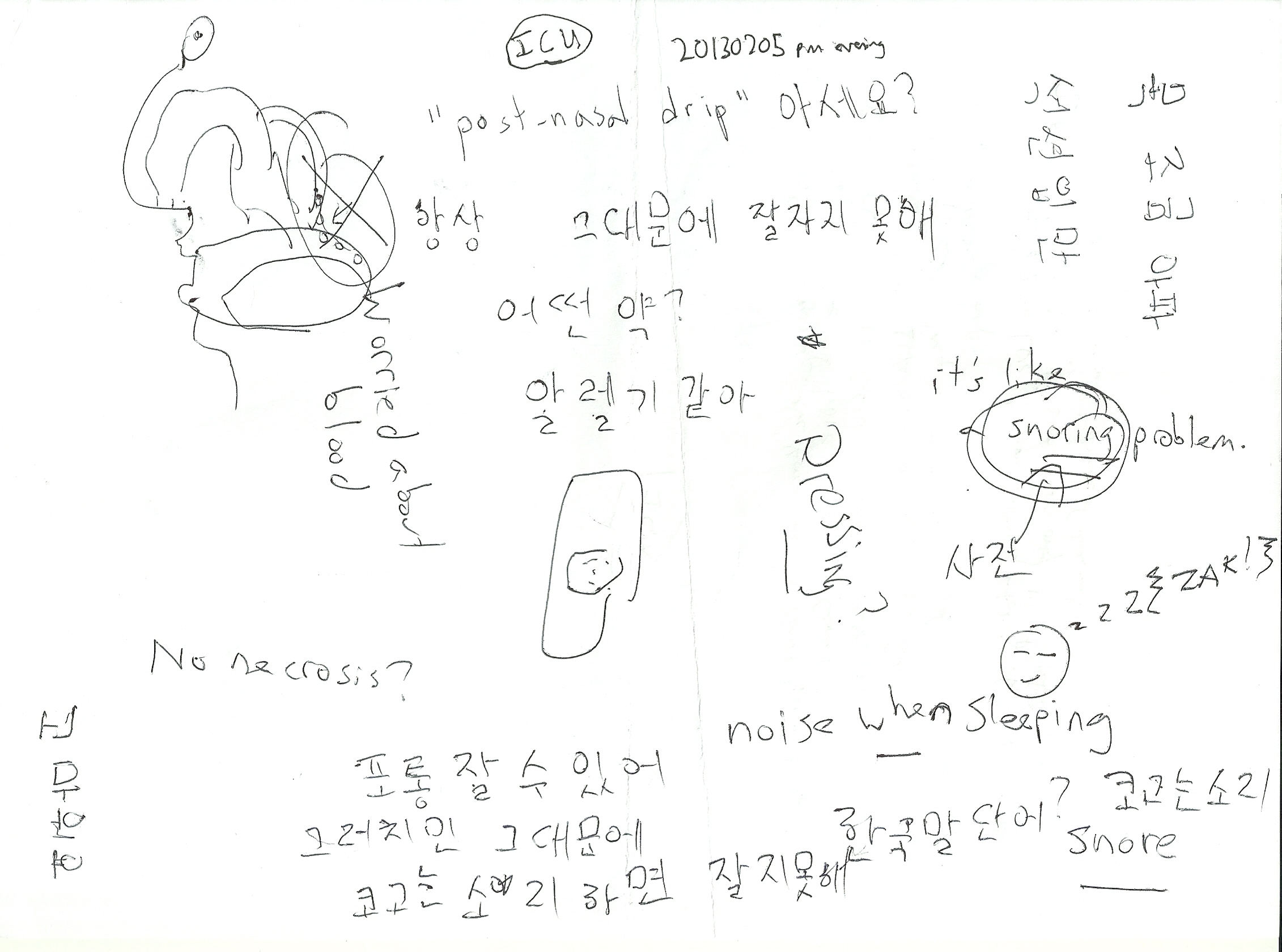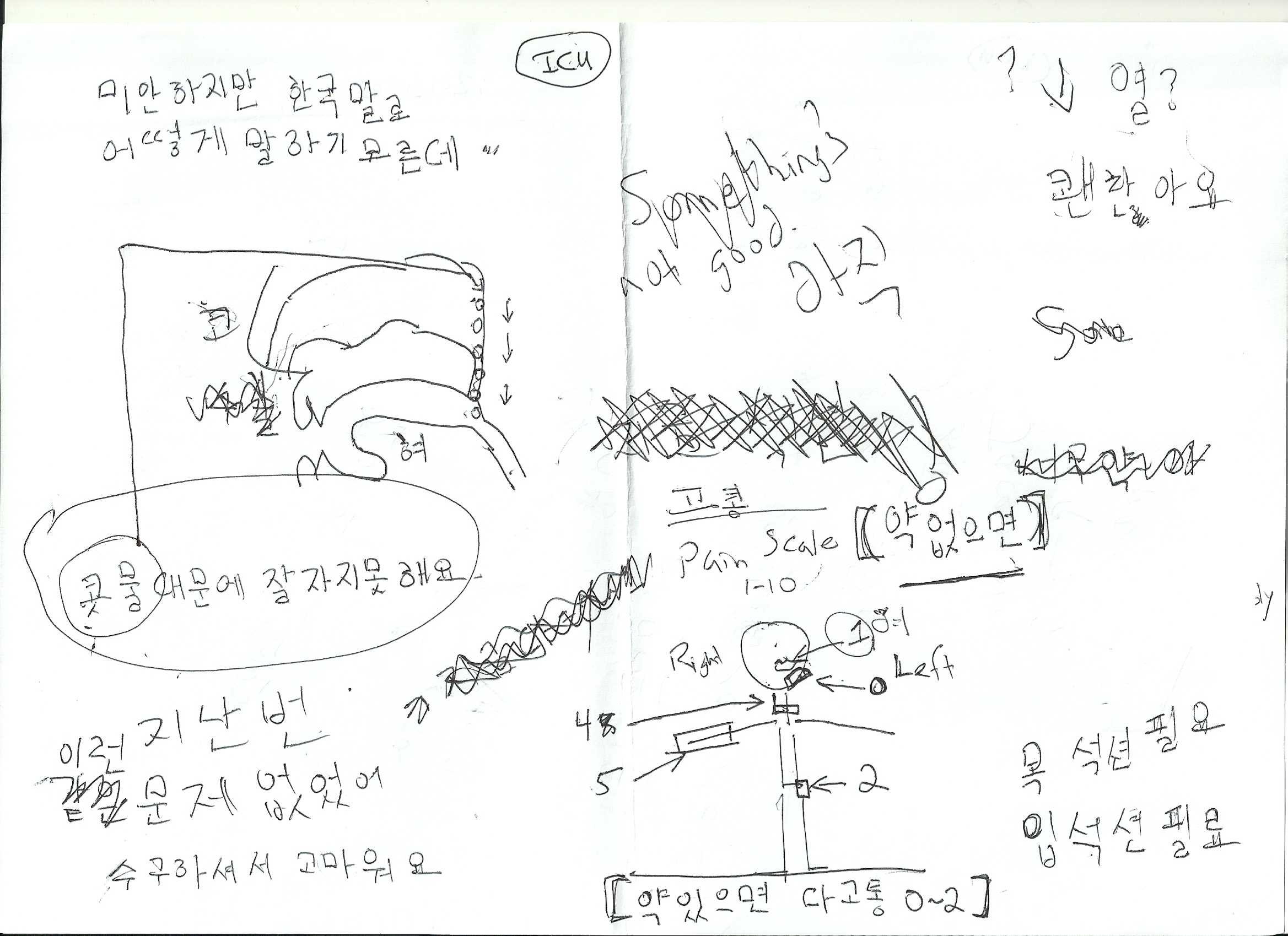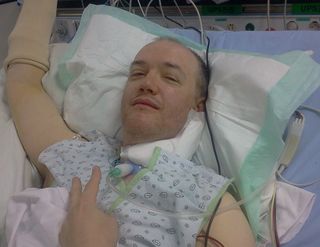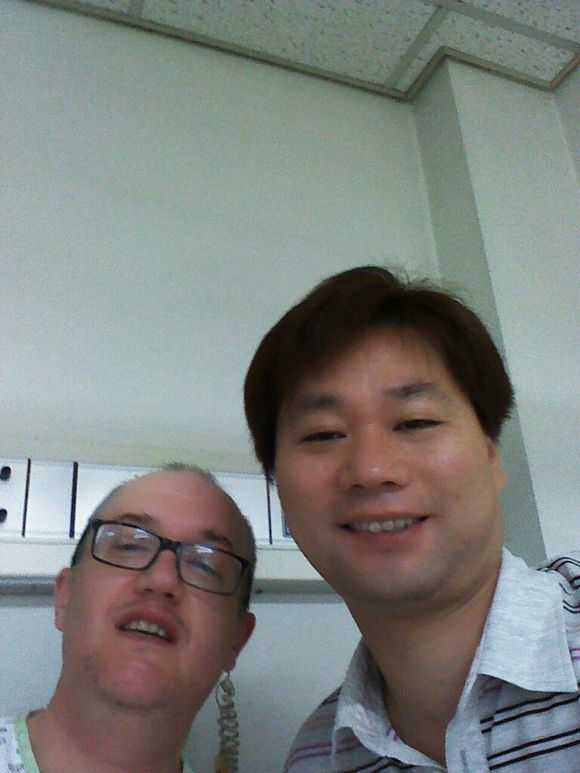another nurse.
caveat: photo from orbit 2
caveat: photo from orbit 1
my friend mary is visiting and i gave her my camera and she was effective following me around and taking pictures. blogposting by email limits me to one photo per post so i will make some entries about various things in photos. my life in the cancer ward. “orbit” refers to habit of walking a large circle the circumference of the tenth floor.
first picture. one of the wonderful kind nurses.
caveat: it worked!
i knew if i got cancer someone would finally come visit me. my brother andrew arrived bedraggled and jetlagged, this evening. now theres more than one way in korea.
so my secret plan worked.
caveat: back bonking
although my korean remains lousy, in other ways i am fully become ajeossi.
koreans use various wooden and plastic doohickeys
to massage their own backs when they cant get someone else to help, generally with a high degree of percussion.
grace brought me the wooden morningstar thing (photo on my windowsill, below) last night, and this morning i dutifully stood beside my bed and bonked my back, like a real ajeossi. it worked ok.
koreans are firm believers in curative powers of back bonking – they would organize gangs of orderlies in the icu and go around bonking all the patients every few hours. i dont doubt that human touch can be curative, and well placed massage too, but im slightly sceptical of percussion on the back as curative per se.
caveat: how i finally came to tears in the cancer ward
oh, yesterday was a difficult day. a day of overwhelming emotion: jubilation, fear, frustration, anger. sadness, comfort.
early on i was in high spirits. i got to eat real food for the first time since the surgery. but early afternoon i had an appointment at the radiation clinic, and that dragged on and on, taxing my limited energy. although i realize its necessary, endless talk of worst-possible outcomes (blindness? deafness? more cancer? permanent loss of you-name-it?) saps my positivity, too.
some coworkers from work came to visit me but i was still filling out forms at the radiation clinic. they actually managed to track me down and visit there, but we didnt have much chance to talk.
at the end of this visit, there was some misunderstanding. a complicated issue around when to schedule a visit to a dentist for a preliminary creation of an oral "immobilization device" which is problematic because my newly reconstructed tongue is still "finding" its shape. there was an appointment scheduled at first for immediately, then for two future dates. i left the radiation clinic sure at least that i had no more appointments that day, for which i was glad given i felt tired and overwhelmed and needed to pee – not a fully trivial undertaking, currently.
but upon my return to my home ward – 10th floor ward 2 – a tribe of nurses descended and insisted i needed to go off to the dentist right away. no time to pee, go wait for the orderly escort by the elevator right now. i tried desperately to explain why this wasnt correct. i tried in korean (which seems to get worse than useless under stress), i tried english. the nurses showed concerned faces but didnt understand what i was complaining about, so they ignored me.
i was furious. not even so much over the appointment mix up as over the feeling i was being ignored. i stewed in this as i waited by the elevator. and waited. because the orderly never came, because in fact there was no appointment.
being right but having been utterly impotent to communicate effectively was worse than any pain id been subjected to so far. when the nurse led me back to my room, i was inconsolable. the nurses were just befuddled, since they didnt understand what was causing my unhappiness – it wasnt any physical symptom. they figured it was loneliness and called curt and grace.
in fact, my worst pain experienced so far, in korean cancer camp, is this psychic agony of failed communication. theres irony in that in this strange, abnormal situation, it remains that it is the banal fact of my poor mastery of korean that finally reduces me to sobbing.
grace came later and consoled me some, she wanted to yell at the staff. but by then id calmed down and counselled against it – my first maxim through this has been, dont piss off your caregivers, no matter what.
actually last night i slept for longer stretches and more deeply than so far. i continue to improve. but i cried for a long time yesterday.
caveat: and on the 8th day, they gave me some food
its not that i forgot the tastes. but with a reengineered tongue and mouth, my face must have been like a babys that first time you give them some new thing to eat. its not the taste thats blowing their minds but rather their efforts to sort out how to control this new object placed there. theres a lot to sort out . . chewing, but not so much as to chew the tongue, then steering the pieces gradually backward and toward the right tube at the back so as not to choke. imagine youve lost all of that automaticity . . . every bite takes several minutes to sort through. i still bit my tongue once.
they gave me juk (rice porridge), fish broth, some finely chopped beef with cabbage and carrots, some fake crab salad, white kimchi, and greens. i managed about 30 percent of the total, focused mainly on juk and fish broth.
caveat: more becoming ghost
one week ago this morning i went into surgery.
i had already long ago acquired a mental habit of chacterizing major life flexion points such as this as moments of becoming ghost. the reasons for this mental vocabulary are complicated and personal, but include how formative Robert Pirsig's Zen and the Art of Motorcycle Maintenance was in my youth (ghost) and how influential Deleuze and Guattari's Thousand Plateaux was in my subsequent philosophical development (becoming). ive been on this road before: the monotonous hospital hours punctuated by vertiginous pain or impotent frustration.
the beautiful green whooshing trees outside my window provide relief, as does the kindness of strangers and the generosity of friends. the ghost, with time, re-anchors himself in the world, a transformed being imminent in the traces of pain and kindness scored across the body of the preceding being.
caveat: giving the white man’s nod to ajeossi
i was doing one of my "orbits" of the ward earlier while my friend grace was visiting. there are plenty of other patients trundling their ivs of varying complexity around the halls at almost any time of the day or night. we all walk around like somnabulent ghosts of diverse mood and genre.
because, currently, i cannot walk and talk at the same time – to walk i need a hand to steer the iv stand, while to talk i need a hand to put pressure on my tracheal hole, and my sum total of working hands is less than two – we just keep a pensive silence as i trundle purposively.
"there. you did it again," she laughed.
i stopped, carefully parking the iv stand close to a corridor wall. i picked up my folded sheet of clean gauze, and pressed it at the base of my neck. briefly clearing my throat first, i finally managed a weak, "did what?"
"i see you're giving the white man's nod to ajeossi now." she seemed surprised.
there are some terms in that statement that require explanation to anyone not inhabiting the narrow english-speaking expat community of south korea.
"the white man's nod" is the subtle acknowledgement, short of actual greeting, that seems to arise between the confreres of any visible minority in any place, so it doesnt belong exclusively to white men – the naming of the term is more the exception that proves the rule. any non-asian who has spent time in korea knows – when youre walking down the street and pass another non-asian, you almost always share a little nod or duck of the head, as if to say "oh, there goes another foreigner like me. here we are, foreigners in korea."
the other term here is ajeossi [아저씨] which just means an older korean male of indeterminate social status.
both these terms being known to me, i quickly grasped what grace was talking about. "i suppose." i said without hesitation, "its not really a white mans nod as a cancer patients nod."
and its true – our pajamas and our iv stands a-trundling, we are highly visible and almost a majority. i think the nod has always been more about a sort of solidarity in shared difference as opposed to any kind of greeting at all: "oh, there goes another cancer patient. here we are, cancer patients in the halls."
graces insight is to point out the sociological identity of two seemingly unrelated situations.
Caveat: Telling It Wrong
Werner Heisenberg, Kurt Gödel, and Noam Chomsky walk into a bar. Heisenberg turns to the other two and says, “Clearly this is a joke, but how can we figure out if it’s funny or not?” Gödel replies, “We can’t know that because we’re inside the joke.” Chomsky says, “Of course it’s funny. You’re just telling it wrong.” – See more at: Marginal Revolution
This one of those things I had stockpiled for when I didn't have much to say. Time is really dragging yet I often lack the energy to do anything except cooperate with the nurses, go to the bathroom and take naps. My friend Peter came today, unexpectedy. Just as he arrived, my favorite nurse (my "Korean teacher") said (in Korean, I translate her sense not her exact words), "Oh good a friend came. He was looking a little depressed [실망] and lonely [혼자]." Peter brought a paper newspaper (Korean Herald) which by skimming helps ward off the worst symptoms of internet withdrawal. He is very kind.
caveat: 2.5 cm
meeting with dr ryu this morning, he felt it was time to start looking toward next steps (ie after hospital discharge). hes going to schedule a visit with a radiation oncologist, but as seems to be my pattern, im still in a “gray area.”
on the one hand, the tumor removed was 2.5 cm across – an inch-wide ball of cancer inside my tongue explains a lot about how much discomfort i was experiencing prior to the surgery. with that size, radiation is viewed as mandatory.
but on the other hand, full biopsy of all removed tissue (tongue and neck lymphs) still reveals zero metastasis, which is quite rare in stage three oral cancers.
so we have to decide how aggressive to be with the radiation.
caveat: good for trying to sleep
what im listening to right now.
[update 2013-07-26: youtube embed was added.]
Sixto Rodriguez, "Sandrevan Lullaby."
Good night.
caveat: changing pillowcases and other life-changing achievements
keeping mind im currently one armed, i really felt like id achieved something grand when i changed three pillowcases today.
to be honest, my hope going into this was that i wouldnt spend 100 percent of my blogposts talking about my illness and the cicumstances around it. but the primary source of my blogs normal diversity is in the diversity of my day to day life: books being read, internet being explored, work and social interactions. less of that is happenning right now both from lack of opportunity but also from an attention span limited by spells of exhaustion. for example, i read parts of two books today – but less than two full pages in each case.
all which is to say. . . the pillowcases really were one of the highlights, along with a certain bureaucratic undertaking that curt assisted me with that hopefully means my brother can come here sooner than august.
caveat: tradeoffs
ive been struggling with the tradeoff i made as part of this surgery. i dont recall if i stated it here quite explicitly, so ill summarize in a few sentences at the risk of being repetitive, beginning with a question: to wit, given the chance to salvage 100 percent functionality of my tongue and mouth, would i be willing to sacrifice with some permanent loss of full range of function of my right hand? the answer was so obvious i didnt even hesitate – i have two hands, but only one mouth and tongue. so i said of course.
i only mention this because this morning with various frustrations, im really feeling the lack of a right hand. right now, i basically have zero percent functionality. there is no indication that that is permanent, but its becoming clear that if current trends continue, ill have full voice and eating long before my right forearm is rehabilitated. and thats a pain.
not in the pain-needing-medication sense but in the getting things done sense. im going to have to relearn how to type at least for the short term, and im not sure i wasnt in a little bit of denial about just how much typing i do.
going to the bathroom, cleaning up, changing clothes – they all become frustrating rube-goldberg puzzles.
ok, that might be enough narcissistic whining. it took me 35 minutes to type this blogpost. last week on tuesday i could have made an entry this length (if ideas were already prepared in my mind) in about four minutes – i used to be a fast typist.
Caveat: Post-99 (An Alternate View)
My friend Peter blogged his version of his night with me in the hospital. I like the idea that one can go and read a different perspective on my experience… in the event anyone’s interested.
[I added this post later but back-dated it to match the date of his post, when I became aware of it – don’t let the timelines confuse you.]
caveat: more of the team
i went to see dr jung this afternoon. while dr ryu is in charge of my neck, they share responsibility for my tongue and dr jung alone is in charge of my right arm. so dr jung and his team changed the dressing on my arm and inspected things.
should i describe what it looks like? i dont really want to, but the following conceit occurred to me: if i saw my bare right forearm on a stand in a modernist gallery, the caption would read “title: lovely spring flower. medium: putrefying flesh on a still living man.” that strikes me as a vaguely baudelairean joke. but in all seriousness, the artists seemed pleased with the outcome.
here is a picture of dr jung, me, and his two surgical nurse practitioners, jang and jeon. who seemed a kind ernie and burt in scrubs.
caveat: dreamtimes
dreams can be strange, of course. there seems to be no correlation between how long one is asleep and how long the dreamtime lasts.
before explaining the dream, ill explain why i was sleeping just now – shortly before noon on monday morning.
this morning was kind of busy. . . i went to see dr ryu in his office/clinic area on the second floor rather than him coming to see me. i took it as a vote of his confidence in my recovery. as a head/neck oncologist, his clinic area has a lot of gadgets arrayed around dentist-type chairs. i sat in one and he examined me and said it seemed the swelling on my tongue was worse. i confessed i was probably talking too much, too soon. he laughed and said, "well that explains it. you shouldnt."
he said he still felt ready to remove the stitches in my tracheal hole (which will allow it to begin healing closed spontaneously over the next several weeks), but said a lot of non optimistic things about still possible complications with the tongue reconstruction despite current very amazing level of recovery and no evidence of necrosis of the transplanted tissue. i realize its his job to talk about all this, but its hard to listen, too.
he then said that before taking out the stitches he would remove the iv style insert at my left shoulder, bringing my total down to one conslidated iv at my right shoulder – i had four when i woke up in icu. this left shoulder one is a bit different though – instead of being hooked to my circulatory system, its hooked with a tube in my body cavity to either the neck lymphs or the general in-between of things up there – i didnt uderstand which, but i was happy to lose the attached external apparatus as it weighs a bit, and hangs permanently attached at my waist so its another obstacle to getting comfortable.
dr ryu said this wont hurt at all (i hate when doctors say that). after 25 minutes of a sensation of angry mice aggressively operating tiny vacuum cleaners in my neck in the spaces between stuff, dr ryu applied a bandage to the hole, which had leaked a vast amount of liquid with the visual aspect of clear blood plasma out down my chest and into my pajama bottoms.
that done, he moved on to the tracheal stitches, which hurt much less. and then he said "are you ok to go back on your own?" i nodded. i was a bit dizzy. so he didnt even call a nurse escort, just sent me along – that was another post op milestone, being allowed freedom of movement unsupervised – the floorwalking in the ward is as you want but its never really out of the perception of one staff or another. wandering through the airport-terminalesque second floor i had the fleeting thought that i could go outside and no one would stop me. just fleeting.
back on the ward i checked in and i did four or five orbits, getting past the dizziness. then i elevated my right arm like i should be doing, and the dressing on my shoulder began to leak. a lot. it was mostly clear but enough blood color to look alarming. i stood and got a nurses attention and we went back to my bed and she redressed the hole and cleaned things up and gave me a fresh change of pajamas.
so as i said, interesting morning. i was lying on my side on my bed, arm elevated, and i fell deeply asleep, as naturally as ever so far. i slept 30 minutes or so until a nurse came for my vitals, and i had a epic dream. not all is clear, but other parts remain vivid even a half hour later.
i was on an express bus traveling from ilsan to seoul. ive done this, though mostly the subway is more convenient, but regardless, out the bus window i wasnt seeing just seoul but also other parts of korea that i know well by bus window, like jeollanam and suwon. it was kind of random but i didnt feel any alarm or curiosity in the dream. i was bored.
the bus queued in traffic for a slow bridge crossing, and i noticed there was a bus next to ours that was a US military bus. in reality these buses look like korean private tour buses and except sometimes for a handwritten destination sign in the front window or looking at the passengers directly, you would never know. but this dream bus next to mine was american school-bus style and painted olive green, like the ones i used to ride at fort jackson. and lo and behold, staff sergeant jones was driving, looking for all the world as i remember him, a cross between prince and samuel l jackson.
he grinned over at me and i noticed the windows were open on both buses. "hey way," he called out as was his wont – "way" was my only name in the army since you dont really have a first name. "you still in korea? i been looking for you. you gotta come with me." he reached out an arm and pulled me right through both windows and found my self kneeling and coughing in the aisle floor of the army bus. "man way you look fucked up we gotta get you to the hospital."
i laughed, "i know." i settled into the seat behind jones and he told me stories about panama, where had served in the 198x invasion.
outside the window, it looked like we were headed for osan on the gyeongbu expressway. sure enough, we arrived at osan base and went through the gate. apparently they were expecting me, as i showed my korean registration card (national id). once on base, though, the scenery changed. the base went on for hours, and looked like west texas. "i dont remember osan like this," i commented. jones just nodded.
finally we pulled up at abandoned-looking cluster of low military buildings. jones helped me walk inside but ran off even as i turned to thank him. i saw a check in counter. michelle sat behind it. it was clear immediately that she didnt recognize me, yet this didnt strike me as odd in the dream. i said i needed to check in and she handed me a packet of forms. all of them were in korean. "theres no way i can do this," i said, "even if i had my dictionary." it dawned on me i didnt have my dictionary (ie phone), or anything in my bag – my bag was still on the other bus. i looked at michelle pleadingly.
she shrugged. "dont look at me. what is that, mongolian?"
[actually i didnt finish writing this but typing on my phone is quite laborious so im posting it unfinished and will work on it later.]
[update: the details i remember are now long faded but the dream continued quite a while longer. i will outline it for sake of completeness.]
i gave up on michelles help and went wandering the mostly empty hospital. i found a stooped old man in a clown suit with a utility cart of the kind janitors use. i asked if could help me. he was friendly but spoke in a rapid uncompromising korean that was useless to me. then i noticed my friend peter with a mop. i felt relief. but peter just started telling me that nobody seemed to in charge and that it was a do it yourself hospital. he pointed out that there were lots of beds and supplies. peter helped me choose a bed in a relatively clean room and next thing i noticed he was fast asleep on a bench in the hallway.
suddenly a group of soldiers approached us. they woke peter up and told him he wasnt authorized. he asked "what about him" pointing at me. they said i was fine. peter asked them who was in charge. a sergeant said, "that clown. you should know that." we both nodded. thats when the nurse woke me.
caveat: dawn after thunderstorms
there were strong thunderstorms last night. i watched the lightening and listened to the rain and went to sleep again around 3am – first time to fall asleep without refreshing (topping off ) pain meds. it felt more natural and for the first time i awoke in a changed position from when i fell asleep. living on the edge. . .
here is a 6am view from the lobby windows. foreground is jeongbal high school and pungsan neighborhood, with the newer high rises of what i think of as “north of the railroad tracks” ilsan.
Caveat: The Last Battle
I wrote the below a week ago but didn’t publish. Since conversations with my friend Grace inevitably spend some time on religion (she is a struggling yet deeply committed Christian who has always been pretty good at letting me be different without evangelizing), I thought it slightly relevant now. We had even been talking briefly about CS Lewis.
 Quite some time ago, I ran across a lost, dog-eared copy of C.S. Lewis’s The Last Battle (edition cover image at right).
Quite some time ago, I ran across a lost, dog-eared copy of C.S. Lewis’s The Last Battle (edition cover image at right).
Way back when I was a child, in my efforts to read the Narnia books, I’d never read this one – at the time, I’d become annoyed with the overt Christian symbolism of these books. I later went on to greatly appreciate much of Lewis’s other writing – I profoundly love his Space Trilogy even today, and consider those books to be very important and formative books for me, even though they’re just as overt in their Christian symbolism as the Narnia books. I read a number of his non-fiction works, too, during my long struggle with (or against) faith in my 20’s, including Surprised by Joy and The Screwtape Letters. He is probably my favorite Christian writer.
So about a month and a half ago I started reading The Last Battle – it joined the giant “pile” of books-in-progress that is the entirety of my apartment’s flat surfaces. I finished it a few days ago.
The symbolism is undeniable, but his take is one I can appreciate despite my own divergent belief system. I don’t like some of the seeming racism that peeks through the symbolism, however – especially the caricature of Islam that is the prominent role played by the humans called Calormenes in the story.
So one thing that surprised me and that I deeply appreciate is the tale of the Calormene who gets caught up in Aslan’s (Christ’s) procession up into heaven at the end of the book. The Calormene is a faithful Calormene – he has been a loyal servant of “Tash” (Allah / The Devil) and so he doesn’t understand how it is Aslan has welcomed him. Aslan explains that (I’ll paraphrase and interpret, here, extensively) it’s not his dogma that matters, but his works. His faithfulness, his kindness, his loyalty – these are the things Aslan looks for and rewards. “I take to me the services which thou hast done to him [Tash]. For I and he are of such different kinds that no service which is vile can be done to me, and none which is not vile can be done to him.” Finally, “Beloved, said the Glorious One, unless thy desire had been for me thou wouldst not have sought so long and so truly. For all find what they truly seek.”
That last sentence, “For all find what they truly seek,” has an almost Buddhist character.
If only more people who claim to be Christian could view my own divergent path with this kind of openminded equanimity – I’d have less quarrel with them.
caveat: running
not really running, but after several hours this afternoon visiting with my friend grace, it occurred to me to wonder, is it possible to try too hard to recover?
the doctors and nurses have endlessly cautioned about the dangers of bedsores, yet both peter and grace said i move around too much. i seem to alternate restlessness with unfocused tiredness. the restlessness leads to a lot of "exercise" – which the doctors said i couldnt really do too much of: i walk endless tiny orbits in the limited corridors of the east half of the tenth floor, pushing my iv stand beside me like an unwilling pet draged on a walk. as i walked alongside grace i wondered if id covered a kilometer yet today.
"i dont know but this more walking than ive done in a while," she said. grace is notorious for being the type of person who flags a taxi for less-than-kilometer trips.
we both laughed. and she mock-complained that rather than trying to decipher my messy hand written notes she had to decipher my raspy badly articulated voice instead.
when she left i ran the pain med for the first time since six am, and went to sleep. i can only ever sleep in one to two hour chunks, due to bladder on iv filling so regularly, so after dreaming i was running through the corridors, now im awake to reflect on my day.
caveat: some of the team
here is a picture of dr ryu, my oncologist, me, and dr seok, a surgical intern i think (he likes to examine stitching in various places).
dr ryu was talking with me this morning. he said to peter, “he talks.” he was refering to the fact that if i cover my tracheotomy hole i can make these breathy poorly articulated phrases.
in answer to his observation i said, breathy but understandable, “한국말도” [korean too].
dr ryu grinned broadly. “youre going to be just fine.”
caveat: my uncomfortable empire of pillows
so many have been so kind and helpful, from close friends to strangers "just doing their jobs" – notably so many nurses going out of their way to help.
yesterday getting out of the icu and coming to the regular ward, helen then curt then grace then peter came to visit me and bring me stuff. then when the hospital insisted that because it was first night out some next of kin should stay with me, peter ended up doing it, sleeping awkwardly on the fold out cot beside my bed and rearranging my empire of pillows – its almost impossible to find a sleeping position when i have four bandaged areas and sleeping flat on my back is impossible too.
such generosity people have shown, that i will emerge from this with such a store of gratitude that i wont have room for anything else – except the six or so pillows on my bed with which we keep trying engineer potentially workable sleeping positions.
caveat: 60 hours cancer free
i suppose that might seem optimistic – pointlessly so. cancer operates by stealth, sneaking into some spot and then waiting months or years to decide to grow in one spot but not another. its hard to inagine there arent some cells floating around. but as long as they dont metastasize then you're essentially cancer free. . . and since all scans and the survey done during surgery didnt seem to turn anything up, the claim doesnt feel that extravagant. the kind doctor ryu hacked the tumor out thursday morning. it was the simplest part. . . most of the nine hour surgery was about looking around my head and neck and scraping out some high risk lymphs and then rebuilding me a functional tongue using meat and vessels from my right arm. i also had a surgery site at my right groin area, but its not clear to me if that was for additional reconstruction materials or for "putting stuff in " ie all those cool snakey vein- and artery-traveling robo scopes and micro tools that are part of high tech medicine.
the whole thing has been incredibly brief. less than three weeks from suggested biopsy to confirmation then removal . . but oral cancers are notoriously fast moving so each step hasnt seemed excessive as it was taken. im grateful to the doctors i have fallen to – they have been compassionate but aggressive which seems a good combo in cancer medicine in its current state.
i have mostly set aside my preexisting discomfort with the discretized non holistic approach seen in cancer medicine, especially in korea. i guess ill give the process a chance, and only if it leaves me worse off than before will i shop actively among the various "alternative" medicines being championed by so many i care about. for all its faults, the standard approach is backed by alot of science, which i think speaks for itself.
my two days in the icu were some of the most intense i ever experienced. . . im going to try to "back post" some imptessionistic details on the dates in question, over the next few days before my memory of them gets too foggy.
caveat: im not even supposed to be standing yet
i got out of icu 3hours ago and decided i needed to stand on my own. this is me. hello world.
i will catch up on messages ( i have too many ) then post more to my blog.
Caveat: ICU Sixth Shift / Kindness
[This post and the others on this topic was written on paper in fragments or even less – single word prompts for ideas – at the time of the events – and assembled later. It’s taken a while to put things together… not through any particular emotional difficulty but just lacking the energy and willpower to do much in the weeks right after the surgery, in addition to a certain perfectionism with respect to the project which I’ve now managed to finally abandon.]
Sixth Shift Word: Kindness
My last shift was a morning shift, and I had a very competent and cheerful woman with glasses who reminded me of a sort of Korean version of my friend Amy (who is a nurse).
I didn’t really have any major insight during this time. I was feeling stronger, more in control, and after my philosophical exchanges with the night nurse, I’d allowed myself several periods of full-on sleep (as opposed to my microdreaming, mentioned two posts back).
This is a sheet of some my conversation with the morning nurse.
This next sheet is my last paper in the ICU – it’s a brief exchange with Dr Ryu, who did some aggressive poking around in my mouth and throat, removing the oxygen tube completely. I spoke too soon on one note: “I feel good. No infections!” That triumphal note haunted me later, when the neck infection became the largest obstacle to my smooth recovery.
The main point, though, is that by this time I had become convinced, based on my experiences of gratitude and suffering in the previous two days, that kindness was the key.
Doing kindness makes us feel better, too.
It’s not like I never thought kindness was important, before. I remember distinctly a conversation I had with Curt way back in 2008, when he was my boss at LinguaForum, when he asked me what I thought was the most important quality in a teacher, and I answered without hesitation that it was “kindness.” To which Curt, at the time, had said only “hmff.”
Now, though… kindness is not just the most important quality of a teacher. Now, kindness is the most important quality. Period.
Don’t let me forget it.
Caveat: ICU Fifth Shift / Suffering
[This post and the others on this topic was written on paper in fragments or even less – single word prompts for ideas – at the time of the events – and assembled later. It’s taken a while to put things together… not through any particular emotional difficulty but just lacking the energy and willpower to do much in the weeks right after the surgery, in addition to a certain perfectionism with respect to the project which I’ve now managed to finally abandon.]
Fifth Shift Word: Suffering
The night nurse of my fifth shift in the ICU seemed to be assigned to me for the same reason as the fourth shift nurse had been: out of my reputation for being “low maintenance” and because she was relatively new or inexperienced. She seemed incredibly young – I’ve had middle-school students who seemed more mature and self-assured. But my fifth shift nurse also turned out to know English the best of any of my nurses.
The fifth shift was by far the most terrible of all my shifts in the ICU – but the reason it was terrible will surprise you – it surprised me. And it ended up being the most epiphanic, too, for that same reason.
You see, the head nurse of the Friday-to-Saturday night shift was a kind of insecure, whiny-voiced Hitler. I call her in my memory and in anecdote “the hitler nurse” – she would rant and rave and berate her staff at any moment whatsoever. She would berate her staff while standing right at patient bedside, criticising their efforts, asking if they were incompetent, insisting they try harder next time. This was bad enough for me, who barely understood, half the time, that this was the content of her rantings – how would be to be a Korean, lying, half-dead and hooked up to some machine or another, and having this hitler nurse standing beside the bed yelling at the nurse in charge of your machine, saying “you did that wrong, you goddamn idiot, etc., etc.”?
I felt guilty, because I felt I had brought the wrath of the hitler nurse down on my own lowly caretaker, and she was clearly suffering because of it. She was agitated. She would make mistakes. She would sit and stare as if trying to gather the strength to continue. She was a person deeply troubled by the horrible treatment she was receiving from her boss and by her own insecurities and inexperience.
At the very beginning of the night shift, I’d asked for “suction” (see previous post). I needed the liquid vaccuumed out of my lungs. Only afterward did I realize my newly assigned nurse wasn’t experienced with this procedure – she was not gentle, she was not fast or efficient, and it was so painful that had my mouth been working properly I would have screamed bloody hell. And afterward I allowed my gratitude to evaporate and I insisted that something had gone horribly wrong during that session of suction, and I made the mistake of showing something written to that effect to the head nurse.
So then the head nurse decided to berate my attending nurse about her failure to care “properly” for her patient for the rest of the night. The hitler nurse yelled at me too – saying well, it’s hard, getting the suction, of course it hurts, what’s your problem, anyway? I was really angry. I was really scared. I wrote the two top things to the hitler nurse – first, 천천히 말하 (talk slowly), and then, 이해못해 (I don’t understand). In both cases, I was digging my own grave deeper, as they are impolite forms.
A bit later, to my own nurse, I wrote the part below, 미안합니다 그냥화났어 (I’m sorry just I got angry). Finally, I tried to explain that in prior suction events it hadn’t been bad, but I think I explain it badly there and I’m not sure it made sense.
I felt so bad. The young woman didn’t deserve it – she was just inexperienced. And she was so shaken by the situation she was making other mistakes. She dropped a thermometer on the floor. She misplaced a syringe for a medicine update. I was terrified. How was I going to recover this mess? I needed to get the attending nurse back on “my side.” I wrote her a note, saying we had to work as a team. I promised to be a good patient.
The transformation wasn’t instant, but suddenly she revealed her excellent English to me. Several hours later, we’re engaged in what can only be called an almost-philosophical discussion of my previously mentioned Scylla and Charybdis (sleep deprivation vs pain – see previous post).
The conclusion of that rather “deep” conversation was that she urged me that sometimes, I will just need to let go of the anticipation of the pain of the suction procedure, and let myself sleep, as that was more important. So, in fact, I slept. And each of her suction procedures improved over the previous, until she was barely hurting me more than the previous nurses had been. I got to be her practice subject for the procedure, and once I’d decided I was going to ally myself with her, it was as if I could stand the pain, better, too.
I ended up making a handwritten thank you card for her on a scrap of paper torn off from my pad, and we developed a good rapport.
I ended up entertaining her with cartoons. And I wrote my epipany in the lower right of this sheet.
The epiphany: “In the end I cannot stand cruelty and unkindness even more than pain.”
I realized with bleak clarity that the cringes and flustered unhappiness produced by the hitler nurse’s constant berations were more painful, to me, than anything I was experiencing physically. That is causing suffering in the human psyche, and for no good reason.
Arguably, my suffering of the body is nothing beside that – for my body’s suffering can be more easily ignored, being in the body, and further, it has a clear reason, which is the cancer and our feeble human efforts to combat it.
What reason is there to be unkind to others?
Caveat: ICU Fourth Shift / Lucidity
[This post and the others on this topic was written on paper in fragments or even less – single word prompts for ideas – at the time of the events – and assembled later. It’s taken a while to put things together… not through any particular emotional difficulty but just lacking the energy and willpower to do much in the weeks right after the surgery, in addition to a certain perfectionism with respect to the project which I’ve now managed to finally abandon .]
Fourth Shift Word: Lucidity
My fourth shift in the ICU was an evening shift. I was assigned a fairly inexperienced nurse and I think she’d drawn me because I’d developed a reputation by then of being a relatively “easy” patient. Probably this nurse, along with the now forgotten first shift nurse, was the nurse with whom I developed the least rapport. I became very interiorized during this shift, and my proprioception began returning and I finally figured out a clear map of my surgery points and tube insertion points.
The real problem I had, more than any other, during my time in the ICU, was with the phlegm and liquid draining at the back of my throat and down into my lungs. I’ve always had a bit of a snoring problem, and possibly (though never diagnosed), it’s easy to imagine I have had episodes of mild sleep apnea, too. So combine that with an oxygen tube through a tracheotomy and major surgery on my neck and throat and tongue, and you can see how this could become truly terrible.
I was becoming sleep-deprived, because I couldn’t just snore my way through the post-nasal-drip obliviously, as was my normal custom. The phlegm would build at the back of my throat, but it was sufficiently difficult and painful to swallow that each time I swallowed, I was unable to do it involuntarily, and would have to jolt fully awake. On the other hand, if I just let it drip down into my lungs and didn’t swallow, I would end up with liquid in my lungs such that every hour or so I needed “suction” (석션) – a truly horrible invention that the US Government has probably used in combination with their exciting waterboarding program. They shove a snakey suction device down through your tracheal hole and vacuum the juice out of your lungs. It hurts worse than most anything I’ve ever experienced even when done gently, and some nurses weren’t so gentle, either.
So it was a Scylla and Charybdis dilemma: either swallow every few minutes to redirect the phlegm to my stomach, and stay awake to do so, or not swallow and be vacuumed out every hour.
This evening, I had decided I preferred sleep deprivation to pain. So I began to experiment.
I found that I needed to swallow, on average, every 12 or so breaths. I began counting my breaths, and saying short affirmations on each breath. I had this idea that I could “sleep” between swallows. It went like this. I would fix a smile on my face – my “fake Buddha smile” as I call it. Then, begin:
1. breathe in. i am strong. breathe out.
2. breathe in. i am healthy. breathe out.
3. breathe in. i am fearless. breathe out.
4. breathe in. i am dreaming. breathe out.
5. breathe in. i am strong. breathe out.
6. breathe in. i am healthy. breathe out.
7. breathe in. i am fearless. breathe out.
8. breathe in. i am dreaming. breathe out.
9. breathe in. i am strong. breathe out.
10. breathe in. i am healthy. breathe out.
11. breathe in. i am fearless. breathe out.
12. breathe in. i am dreaming. breathe out.
swallow.
repeat.
Over hours, I perfected this, and found that I could actually fall asleep, in a weird, weird way, saying this “mantra.” Each time I would utter the word “dreaming” I could feel my mind snapping into that REM state, and the coherence of my consciousness dissolving. It was quite remarkable. And yet I remained utterly “vigilant” of the situation around me – I heard the nurses, I heard what was going on, I felt the phlegm building at the back of my throat. And the images that would come in the “dreaming” moments were somewhat guided. I could dream about things that I chose – guided imagery.
I know I freaked out some nurses. I would have my eyes closed, sitting slumped in my bed, to all appearances asleep, but when they approached, before they touched me to take my vitals or do some thing or another, I would hear them, and I would snap “awake” and be regarding them, smiling. Utterly aware of my surroundings, yet sleeping, every 12th breath.
I have experimented a little with trying to repeat this experience since then, but I haven’t really pushed that hard, and it’s too easy, now, to “fall asleep” for real. Over time, I intend to explore the relationship between meditation and dreaming and lucid dreaming and semi-dreaming.
Here are a pair of sheets I’m pretty sure I wrote during my 4th shift.
This picture I’m trying to explain my post-nasal-drip problem.
This second picture is more of that, but also I think I made a very interesting “body pain map” in the center bottom – I was rating the pain of the different locations on my body – it really wasn’t that bad, note that I wrote carefully next to the head of the pain map “약없으면” which is my pidgin Korean for “when I’m not taking pain medicine,” while below I wrote “약있으면 다고통 0~2” = “when medicine all pain 0~2.” The pain medicine was working just fine.
Caveat: ICU Third Shift / Hermitage
[This post and the others on this topic was written on paper in fragments or even less – single word prompts for ideas – at the time of the events – and assembled later. It’s taken a while to put things together… not through any particular emotional difficulty but just lacking the energy and willpower to do much in the weeks right after the surgery, in addition to a certain perfectionism with respect to the project which I’ve now managed to finally abandon.]
Third Shift Word: Hermitage
My third shift, the Friday morning shift, I had a slightly pudgy nurse
with a friendly face and a halo of short red curly hair – in Korea this
isn’t as uncommon as you might think, what with hair coloring and
styling and perms and all that. She helped a lot. She was a bit
absent-minded though.
One time, I remember, she detached my breathing tube to clean around the wound there, and she left it lying loose, like a fat, translucent, hissing worm, on my chest, and ended up going away to do something else. It was too early in my stay for me to have the confidence I had later on to lift my arm and place the tube myself – my right arm was utterly immobile, and the range of movement of my left arm seemed limited by the weird holes in my body’s proprioception that I was experiencing. So the tube lay there for some 5 or 10 minutes, while I tried feebly to get my nurse’s attention – anyone’s attention – and point out the situation. I was voiceless, and so unless someone was looking, I had very little I could do to get someone’s attention.
When she finally came back and noticed, she shrugged and put it back in place, saying “sorry.” In fact, I wasn’t in any particular danger, it was just a breathing assist with oxygen, not a breathing replacement. Still, I was deeply alarmed at my sense of helplessness.
Later, toward the end of my stay, I realized I could get a nurse’s attention by holding my breath. This would set off the alarms on the breathing monitor and send someone running quickly. But that came later.
I decided during this morning shift, entrapped in these feelings of helplessness, that this ICU, and this cancer that had put me here, were my hermitage. Why, specifically, would I choose the word and concept of hermitage?
The korean word for cancer happens to be a homonym for the korean word for hermitage (ie. a small hermitage such as Buddhist monks will occupy – not a major monastery but a small mountainside retreat). Both words are the syllable “암” [am]. This time in the ICU was coming to resemble a sort of hermitage. I didn’t have my glasses. I was not allowed my phone. I couldn’t sleep well, not because of pain but because of post-nasal-drip.
My time in the ICU became my 48 hours in the wilderness.
I have always been fascinated by the idea of hermitage. I remember in my “Quaker” phase I would read these little Quaker journals in the meetinghouse library in Mexico City, and there was a series on Christian hermitages, describing different traditions and approaches, everything from Catholic to Finnish Orthodox to Coptic. I remember thinking, Quakers need hermitages, too. And I was then and remain transfixed by the figure of Thoreau (even recognizing that there were senses in which his hermitage at Walden was a “cheat”), or more contemporary writers like Edward Abbey with his Desert Solitaire.
I have often craved and intended hermitage, and there’s a sense in which my “8 hours of solitude a day” requirement is a sort of daily hermitage. The closest I came to true hermitage – the several months living on my uncle Arthur’s land in Alaska in the Fall of 1998, went badly, in retrospect, but it was more because I wasn’t prepared and wasn’t in the right frame of intention to pull it off.
So here, then, in the ICU, I had been gifted with a kind of social hermitage, yet surrounded by dying and suffering people and militaristic nurses.
Here are some pages from my interactions during the 3rd shift – including visits from Dr Ryu and Curt.
The first page is just a journaling effort, and the first entry is from 3rd shift and the second is from 4th shift, q.v.
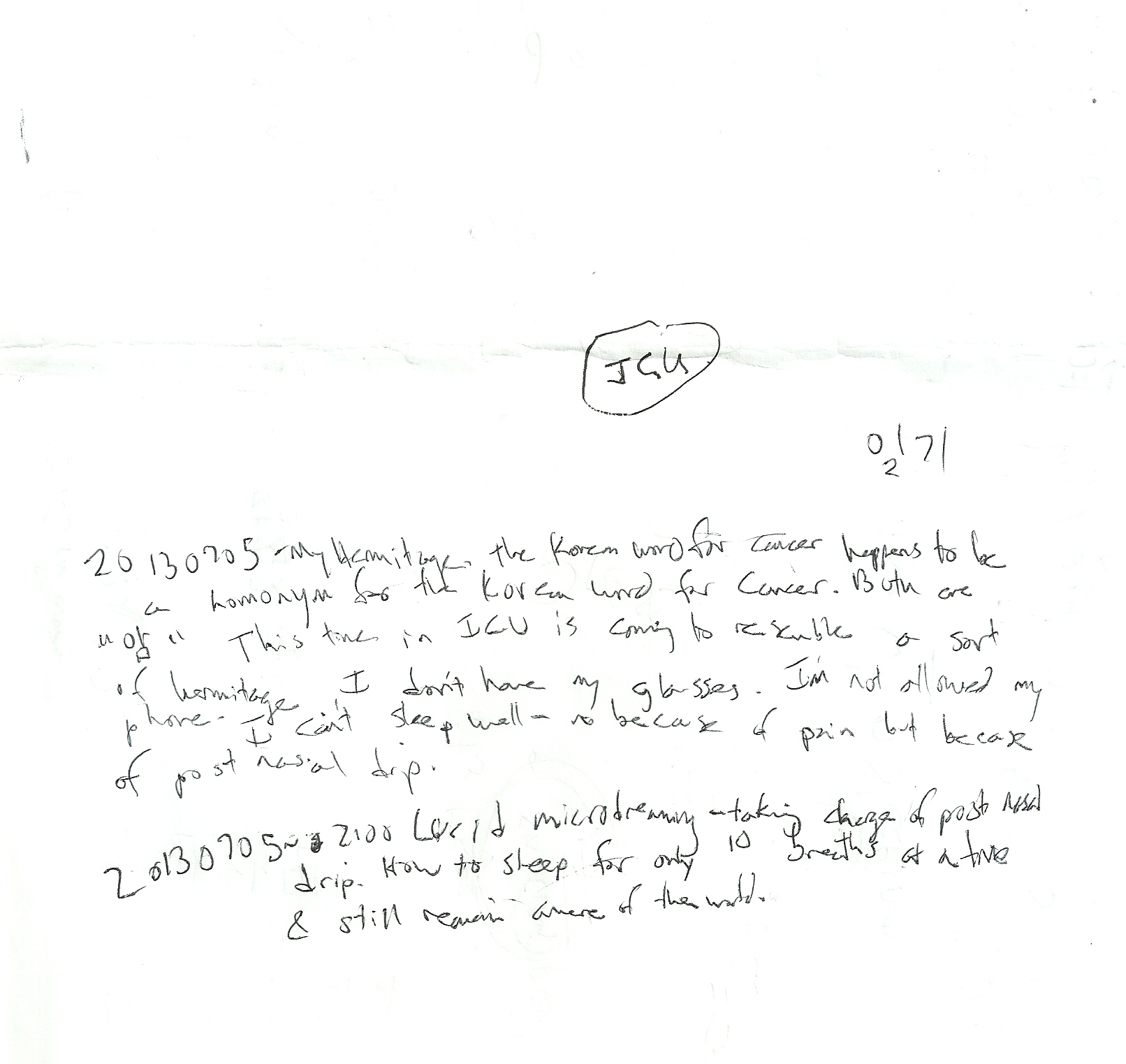
This includes my visit with Curt.
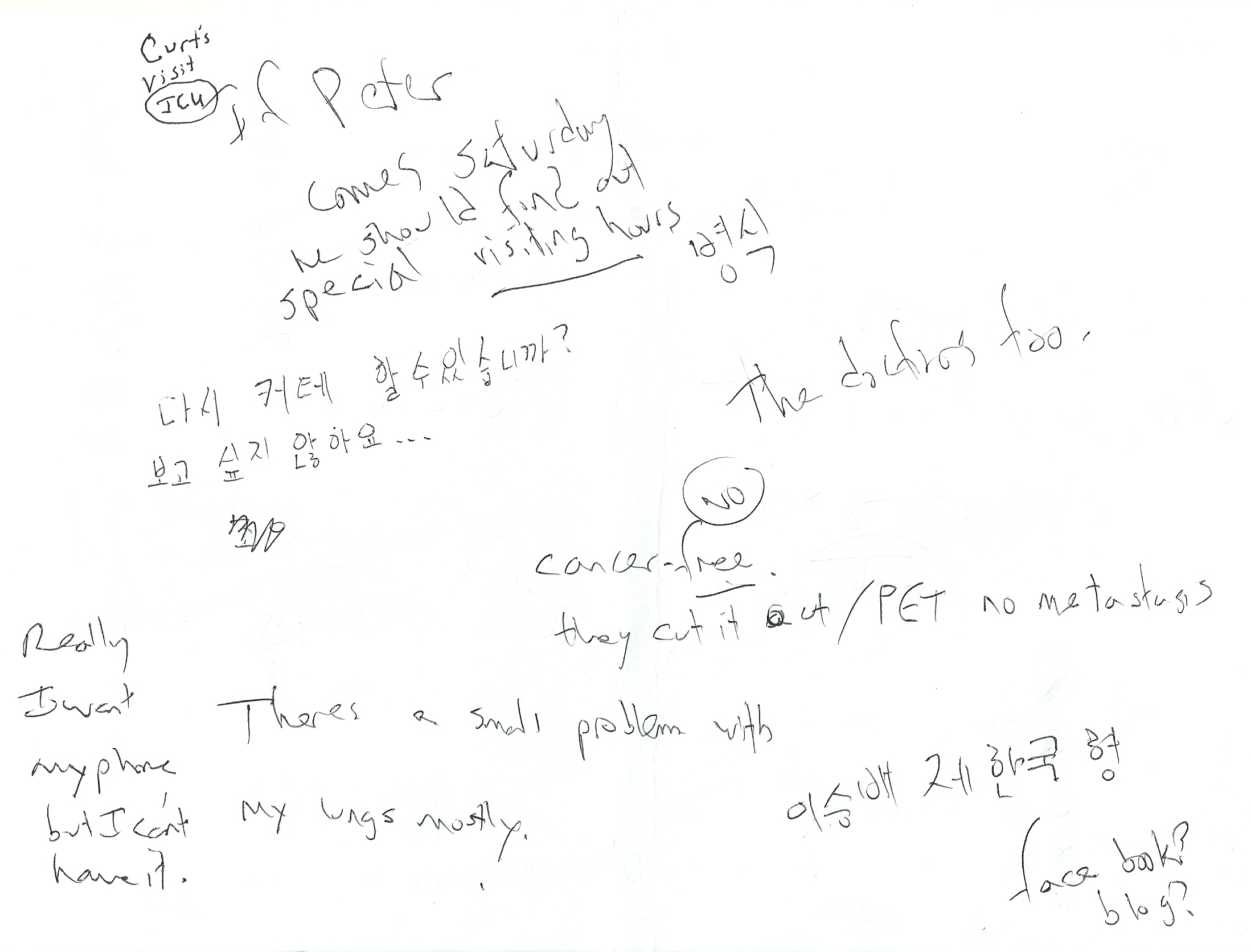
This seems to be mostly my conversation with Dr Ryu or a surgical intern.
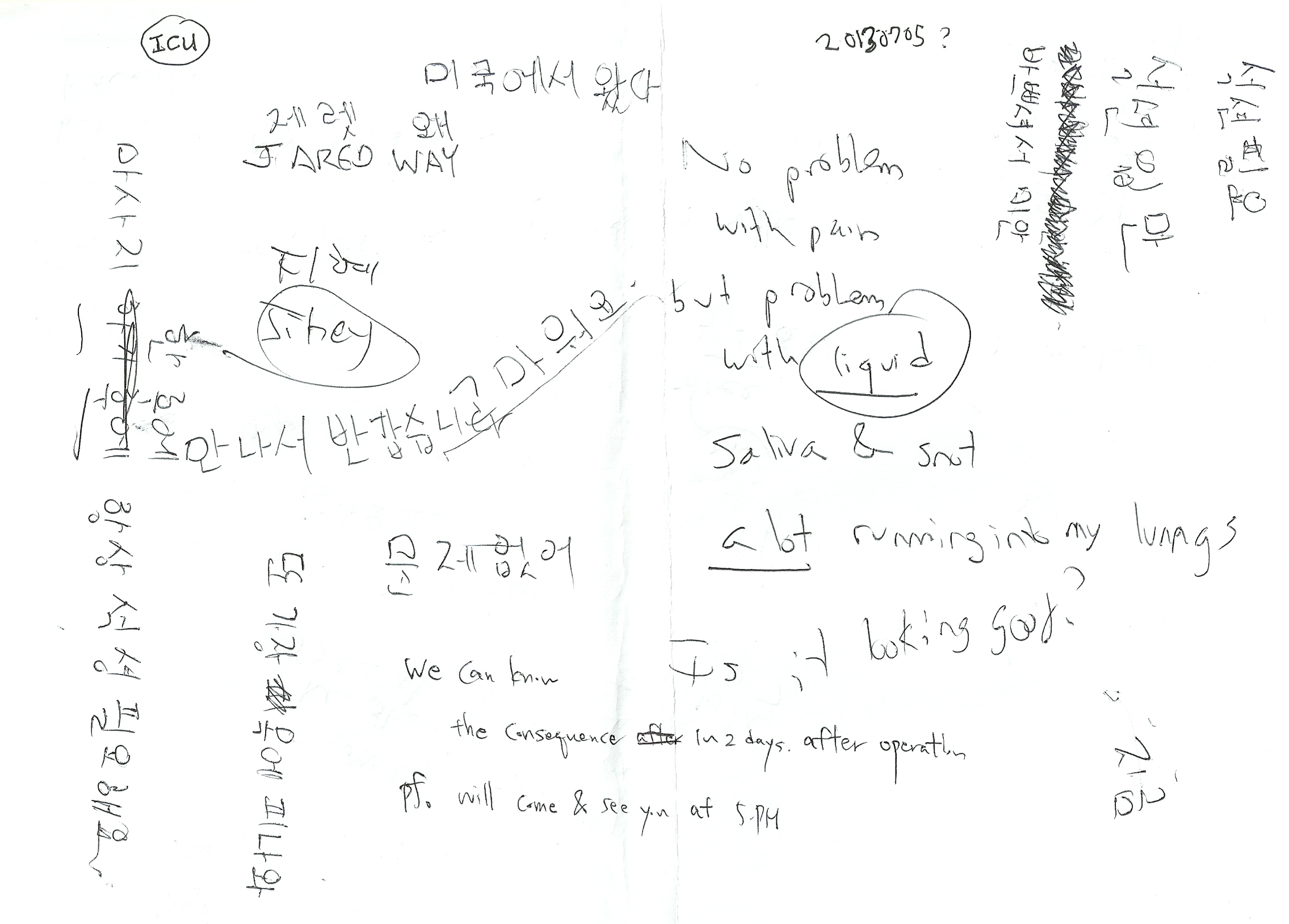
The nurse brought me a radio to keep me entertained.
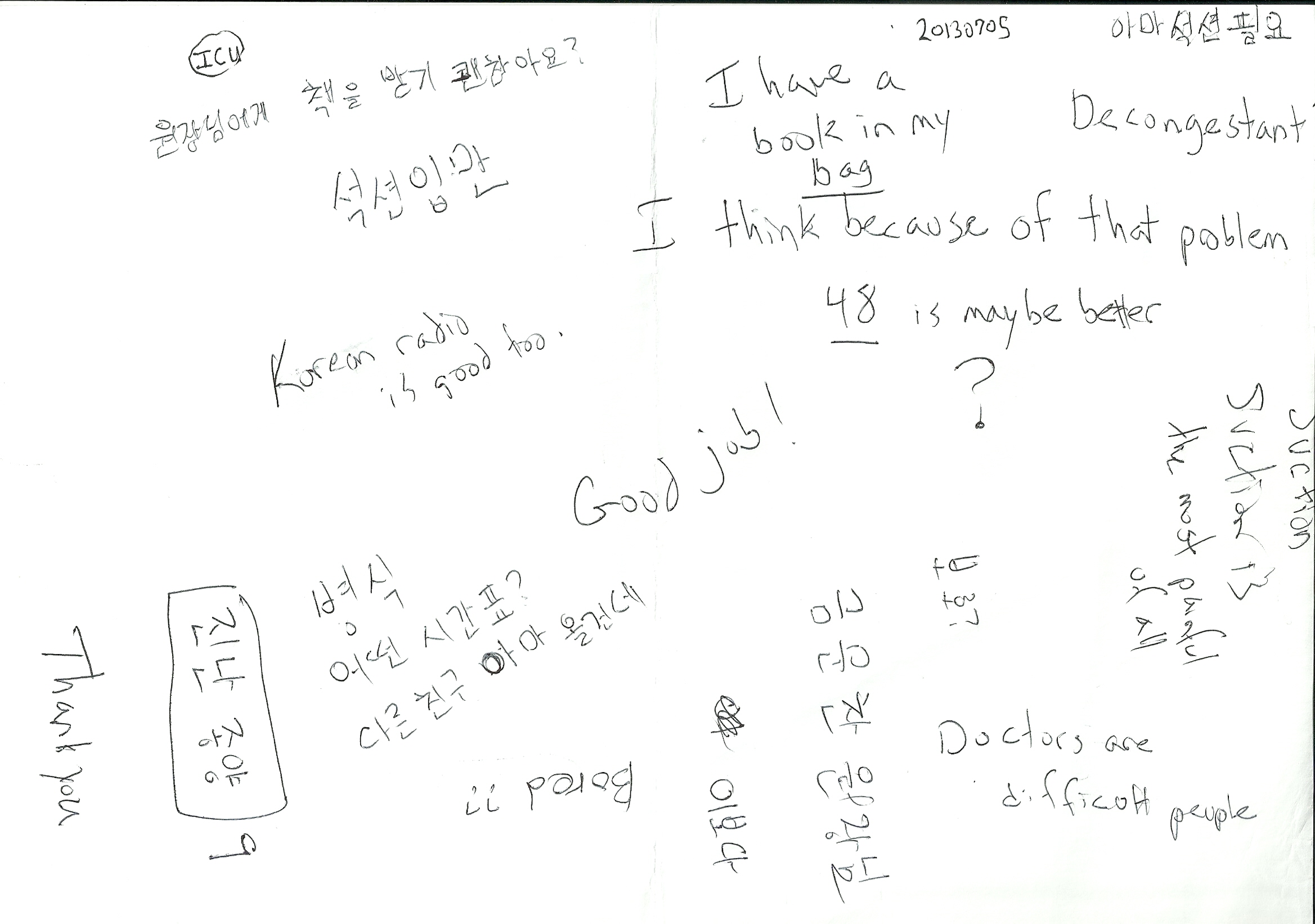
Caveat: ICU Second Shift / Gratitude
[This post and the others on this topic was written on paper in fragments or even less – single word prompts for ideas – at the time of the events – and assembled later. It’s taken a while to put things together… not through any particular emotional difficulty but just lacking the energy and willpower to do much in the weeks right after the surgery, in addition to a certain perfectionism with respect to the project which I’ve now managed to finally abandon.]
Second Shift Word: Gratitude
The following shift (my second in the ward) was a night shift: there was a
very accommodating male nurse. He was communicative, competent, friendly, and even handsome, to boot. He frequently was off assisting the other nurses, too, so it was one of my “least attended” shifts. But when he was beside me his efforts were always exactly right.
The nurses in the ICU are hardcore. But they are human, they make mistakes, too. I felt so vulnerable to them, and I felt that it was becoming a sort of human-relations puzzle to solve how to get the best care possible, given how limited my communicative abilities were.
So meditating on how to solve the problem of maximizing my quality-of-care (and really, I was thinking in those terms even in such straits), at some point between my first shift there and my second, I realized that the key is gratitude. Not just felt gratitude, as in a prayer or affirmation, but expressed gratitude.
I began trying to remember to write “고마워요” [thank you] on the corner of each new page of note paper that I was using to communicate my needs, and anytime any nurse did anything, I would point to that word – saying, in effect, thank you for doing your job. Some nurses found it amusing, or perhaps it made them uncomfortable. I’ve realized in retrospect that the ICU nurses have to work very hard to avoid emotional entanglements with their patients – especially in a cancer hospital, many of these patients are dying, and many more are in such great suffering that they are unreachable through human contact.
The sheer volume of human suffering ambient in the large ICU room was constantly palpable – there was moaning, there was crying, there was screaming, there were men yelling like babies, “아파” [it hurts!]. There were doctors rushing around reviving patients who had stopped breathing or who were lapsing into comas.
Yet this little quirk of mine, of pointing at “thank you” and making eye contact with the nurses when possible, proved remarkable. The coldness faded a little bit, and they would take extra steps to make me comfortable, or even strike up “conversations” – me writing in my pad in bad mixtures of Korean and English while they phrased simple questions about my background or situation.
I was being forced to write everthing on sheets of paper – I did not
talk at all during my time in the ICU. I wasn’t able to remember to save
some of the papers from the earlier shifts, but I believe this paper is
from the second shift – it’s me introducing myself to my nurse and
maybe some other nurse or orderly.
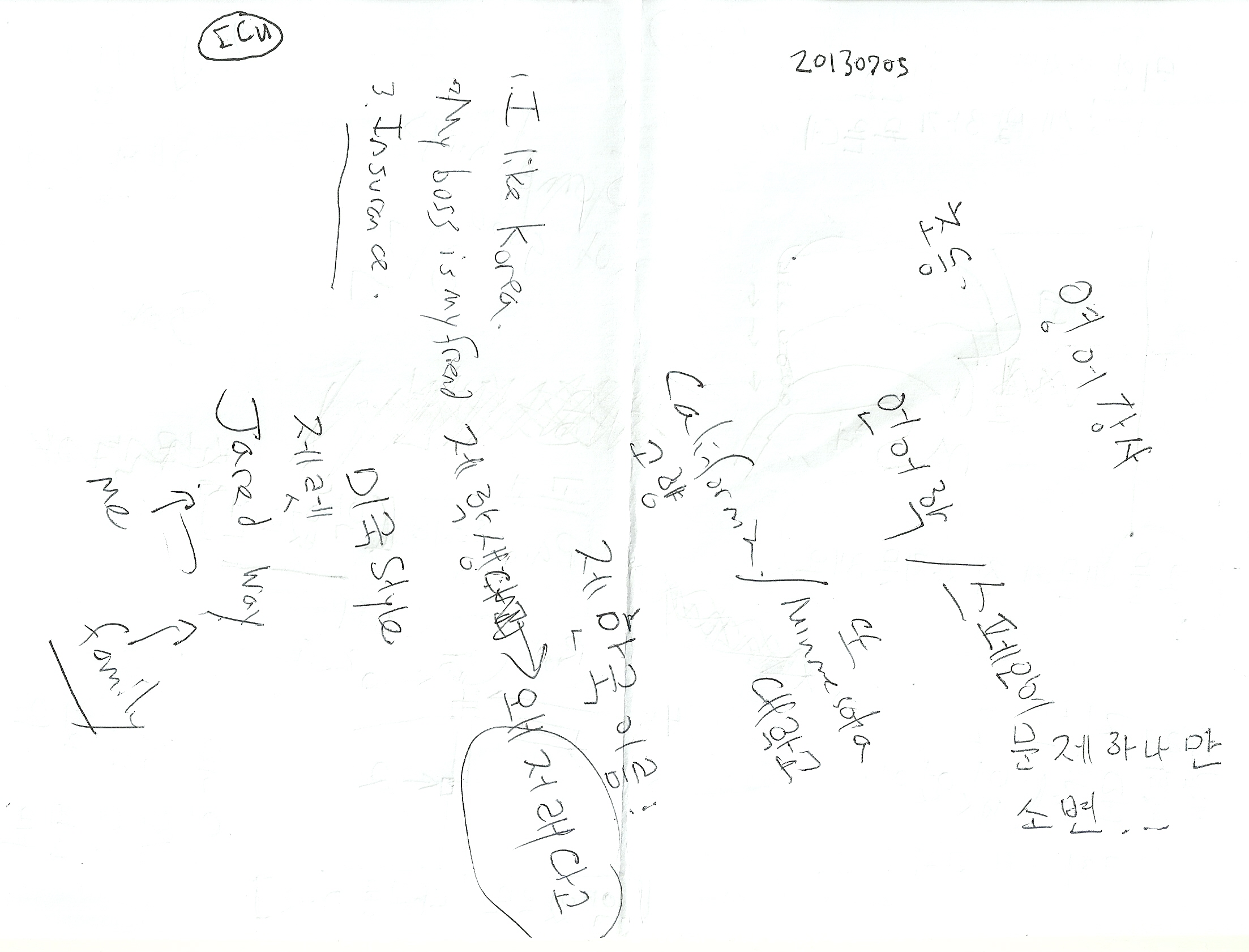
Caveat: ICU First Shift / Joy
[This post and the others on this topic was written on paper in fragments or even less – single word prompts for ideas – at the time of the events – and assembled later. It's taken a while to put things together… not through any particular emotional difficulty but just lacking the energy and willpower to do much in the weeks right after the surgery, in addition to a certain perfectionism with respect to the project which I've now managed to finally abandon.]
First Shift Word: Joy
Emerging from the haze of anaesthesia, my coworker Helen was there with my doctor to welcome me among the living. My only feeling was happiness to find myself still among the living.
My surgery had concluded at about 7 pm or so – my understanding is that lasted well over 9 hours, total. During my entire time in the ICU, I did not have easy visual access to a clock, and knowing the time seemed, anyway, to be the least of my worries.
Life in the ICU is divided into shifts, and the shift changes are huge happenings – the cycle of life in the ICU is entirely by shift. Nevertheless, the lack of access to a clock for the first part and my own fuzzy-headedness for the second part meant that for the longest time, I couldn't figure out if there were 4 shifts in a day or 3. In retrospect, I'm sure now that it's 3, and since my overall stay in the ICU was just short of 48 hours, I experienced a total of 6 shifts. I will write about each shift separately, as the character of the shift varied according to the character of the nurse attending to me more than according to any progress or change or landmark in my own body or its recovery.
So…
That first shift, I can't in fact remember the nurse's face. After my initial wake up and short talk with Helen and Dr Ryu, I remember almost nothing. I was overwhelmed. I couldn't "feel" my own body in large swathes, and I didn't realize, for example, just how many tubes I had attached to me and how they all worked until well into my second shift in the ICU.
One example was the fact of my catheterization: I simply didn't know, and no one thought to tell me, probably because they thought I knew or that it didn't matter. The thing is, I felt this strong need to pee, but I kept "holding it" – not really, as I later found out, but I managed the sensation of "holding it," and when I mentioned the need to pee to a nurse all anyone ever said was "it's OK," which really didn't make sense to me until I realized my catheterization.
In the end, lying there feeling helpless and frusrated and overwhelmed, my emotional response was unexpected: simple joy. "I'm still alive. That's cool." I repeated it over and over, and there was little else going on in my mind.
Update, 2016-03-06: I was going through old files on my computer and found this photo – I don't think it's ever been posted on this blog but it should be, for completeness' sake. It is the first picture taken of me after my surgery, by coworker Helen when she came to see me in the ICU.
caveat photo finish
I Love You All
No caveat, for this one.
July 3rd is Michelle’s birthday. I will celebrate the 4th in surgery I guess.
Here I go, soon. they said eight am. . . . maybe this is last post to blog for a while. see y’all later.
caveat: storm song
i awoke from a dream at 445 am.
im with a large group of people from all different parts of my life. we are driving aimlessly around new jersey. michelle and jeffrey and i used to do that. we are a large group, so there are several vehicles.
everyone is comparing musical compositions. its like surfing music on youtube. people keep looking, all of us, over and over, at the sky. a storm is coming. but some of the music is haunting. we drive to a place that is like back in time. one of my students says cryptically that it is as he suspected.
a tall, elegant dark haired woman is sitting in a 1930s era car, reading a book. she doesnt notice us. there is a meadow and a tiny stream and a picnic blanket but shes sitting in the car alone. i walk over.
when i reach the car the woman has disappeared like a ghost. my friend curt points to the sky. the storm, he says. but the music im hearing is too beautiful. i lie down on the ground in the shade beside the old car, listening to music i can neither recognize nor forget nor even describe.
i see my friend bob standing nearby. why is everyone looking at the sky? i ask. he says, the storm. who is making that song? i ask. he says, i thought that was yours.
i woke up choked up, like about to cry. after about ten minutes beginning to write this down, the nurse came in saying ah already awake in half english half korean. doing blood pressure check etc. the morning nurse is very cheerful.

